

















































brought to you by BRITAIN'S MUNICIPALLY-OWNED AND INDEPENDENT BUS SECTOR in association with
THE ALBUM CONFERENCE WORKBOOK
THE ALBUM REPORT 2023 PLUS




















































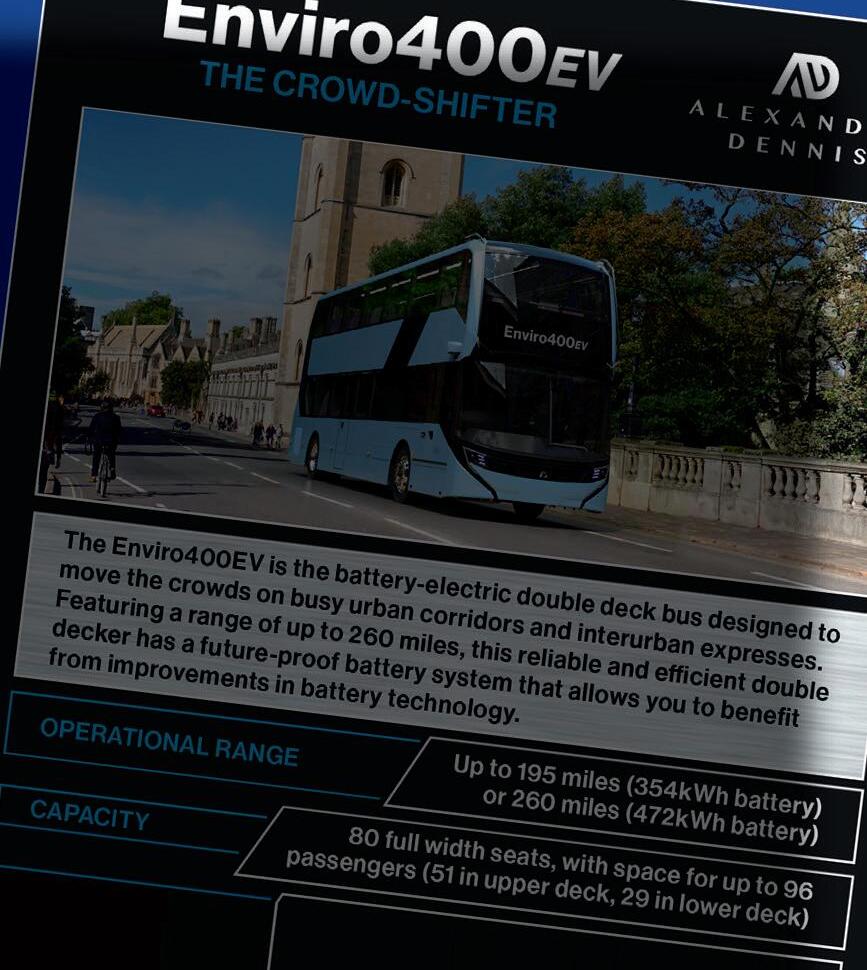














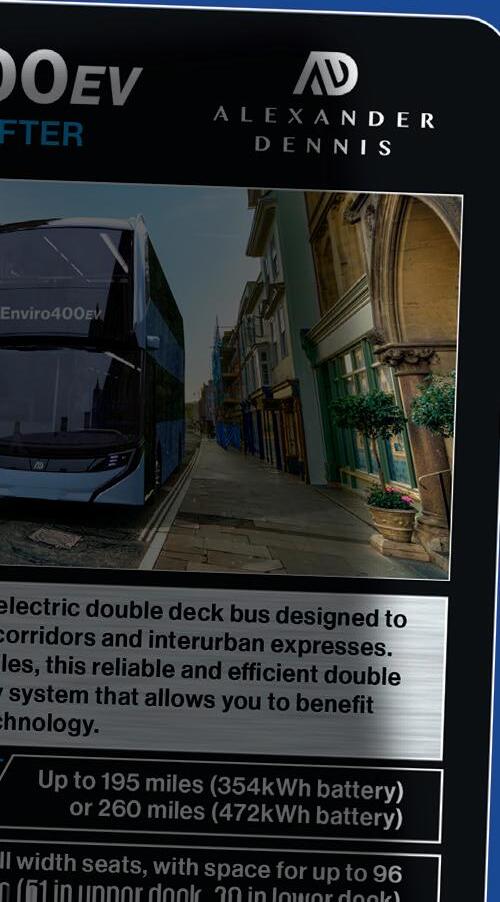






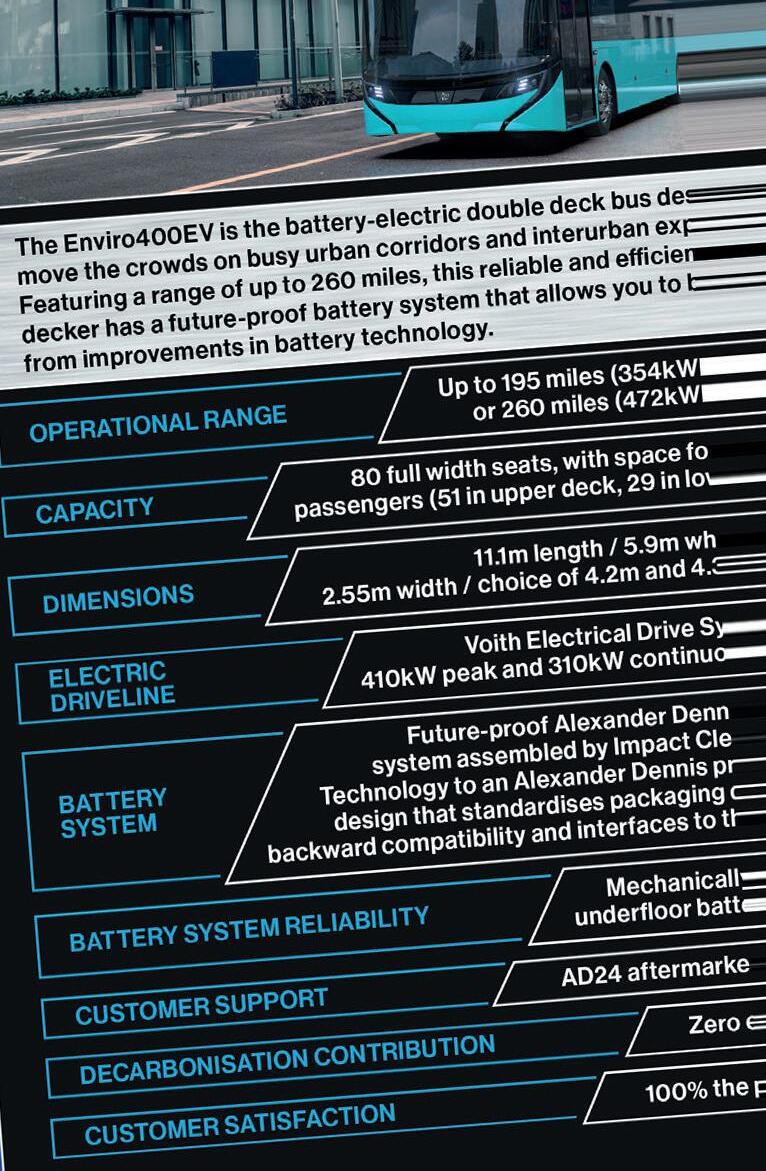


















Welcome to Te ALBUM Report 2023, a publication from Passenger Transport devoted to Britain’s independent and municipal bus companies. Returning for a seventh year, this year’s report also incorporates the Conference Workbook for the 2023 ALBUM Conference, hosted by Lothian Buses in Edinburgh on April 25-26. We hope you fnd it an interesting read and welcome all feedback.
ALBUM Chair Bill
identifes 10 ways that buses can be made better
Tap-to-ride, city wide. Edinburgh’s journey towards seamless multimodal travel

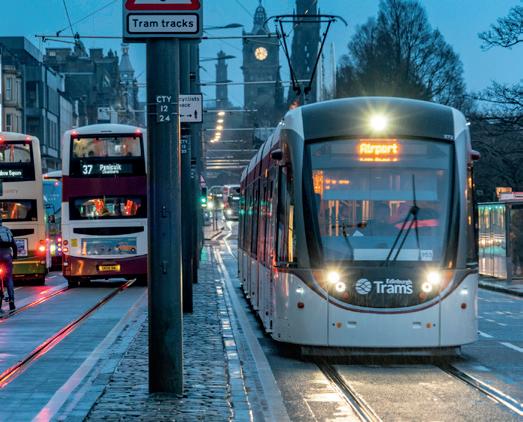
Lothian Managing Director is looking forward to a great summer in Edinburgh
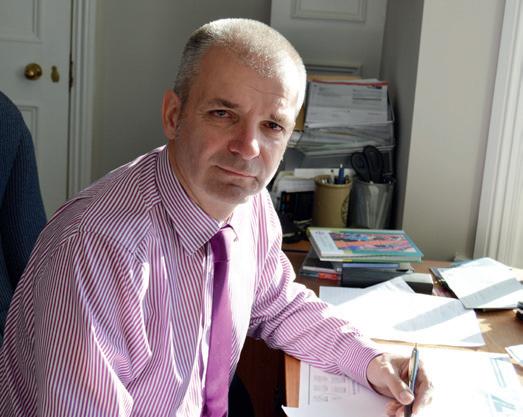

A look back at some of the key events of the past 12 months for ALBUM members
EPM

Sofware solutions specialist aims to help bus operators deliver on customer service



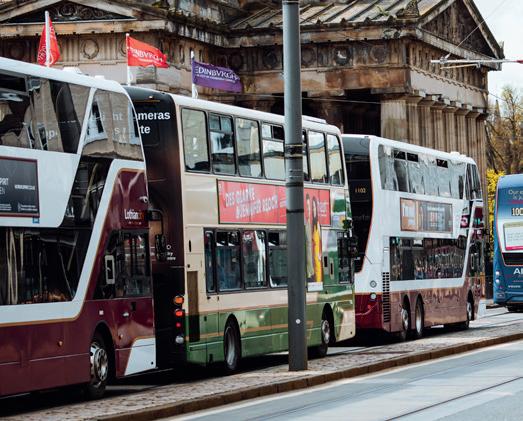
Well known for its ticketing solutions, Ticketer is now expanding with new solutions


Te eyes of the world were on Edinburgh - and Lothianwhen Queen Elizabeth died
All the information you need about the 2023 ALBUM Conference
PASSENGER
Te rise and rise of QR in bus ticketing, and their role in driving revenue growth


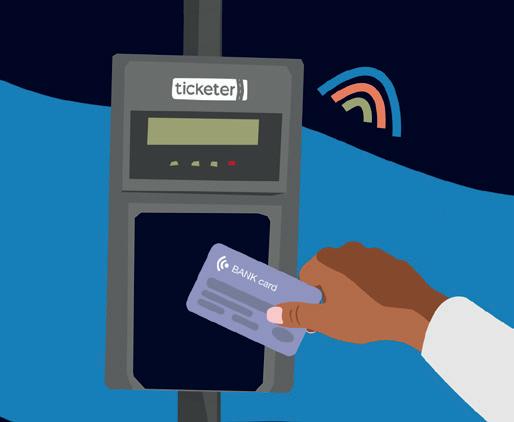

5 WELCOME The ALBUM Report 2023 Contents
Hiron
BILL HIRON
FLOWBIRD
REVIEW 2022/23
SARAH BOYD
TICKETER
OPERATION UNICORN
CONFERENCE WORKBOOK LANLink Live VIDEO MANAGEMENT SYSTEM • Live camera streams over 4G • Remote footage viewing and downloading • View recordings in any web browser • Cost and time savings for operators • Compatible with all current Timespace DVRs Timespace V500 Digital video recorder Proud to supply vehicle CCTV to tspace.co.uk
bus operators to maximise the benefts of installing vehicle CCTV TIMESPACE 6 18 27 8 20 12 23
25 29
Helping
16
10 WAYS WE CAN MAKE BUSES BETTER
ALBUM chair Bill Hiron believes he has 10 policies that can transform the industry. He spoke to Andrew Garnett
It has been a tough few years for bus operators large and small. While the austerity of the last decade had a big impact on the sector, it was nothing compared to be problems the industry has faced during the Covid-19 pandemic. As nations locked down, bus operatorsmany surviving on emergency funding streams - kept calm and carried on.
But as we move into the post-pandemic learning to live with the Covid era, operators are increasingly concerned. Patronage recovery varies tremendously from operator to operator and from area to area. Concessionary travel struggles the most as pass holders continue to studiously avoid buses, perhaps as a result of the impact of government “avoid buses” messaging that still lingers
in the minds of many.
Te fnances of the industry have also never been in a more perilous position.
Bill Hiron, the boss of bus operator Stephensons of Essex and chair of ALBUM, tries to be sanguine despite the headwinds that have bufeted his business over the last few years.
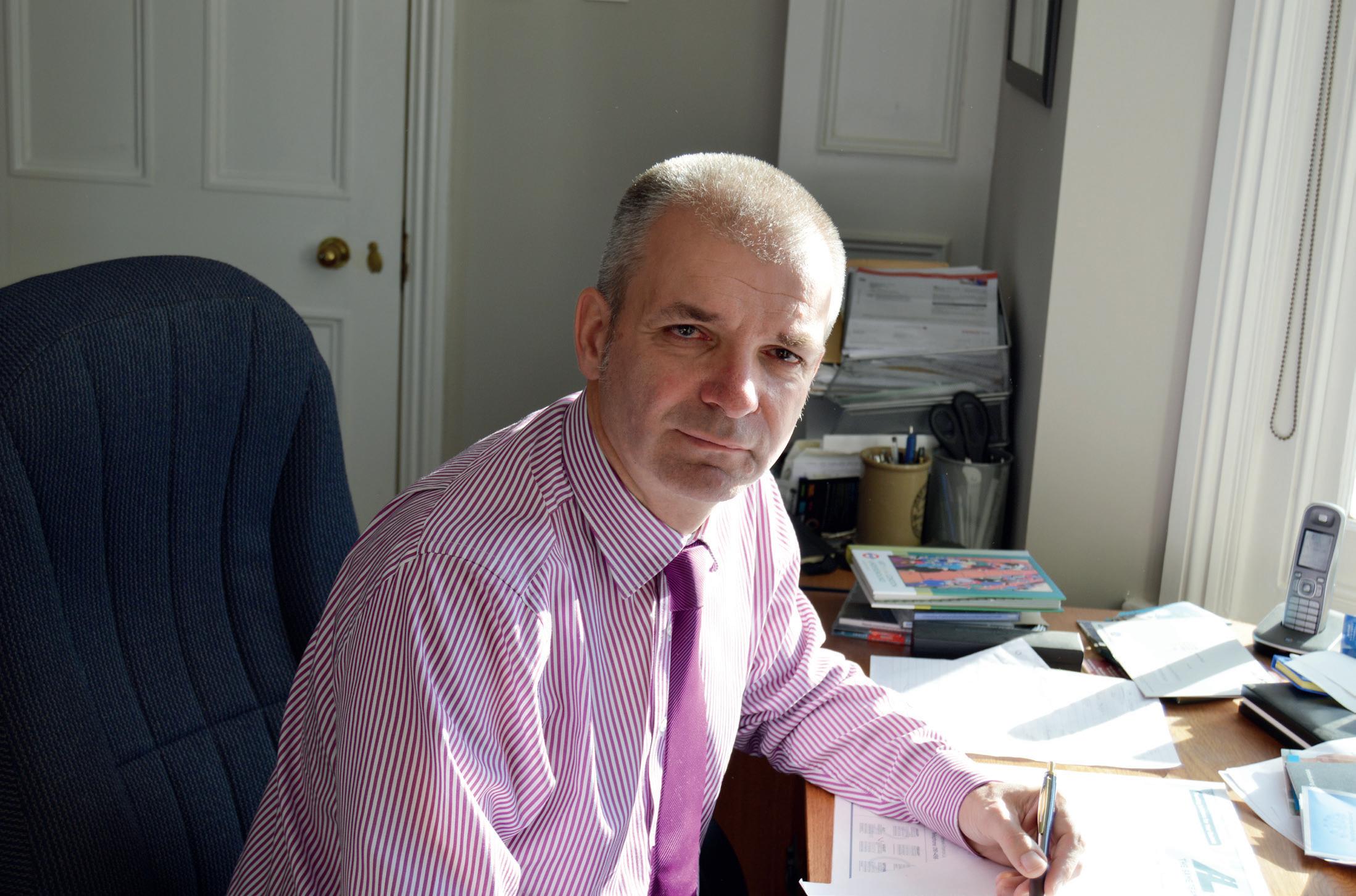
“If I talk from an SME perspective - and it’s probably not that much diferent from the larger groups, to be frank - there’s an awful lot of resource-hungry stuf and technology stuf being thrown at us at the moment,” he says.
Hiron reveals that he has two managers in his business who spend at least 50% of their time working on three areas - providing data to the Department for Transport about the £2 fare cap; a further packet of data that is required for the Bus Recovery
Grant (BRG); and yet more data for the Bus Open Data Service. “It’s been a real challenge,” he adds. But that challenge looks like it could become even more challenging for the humble ALBUM member bus operator. Hiron points to the prospect of zeroemission and wonders just how smaller operators will cope with, not to say pay for, the transition.
“Zero-emission is not just about buying an electric bus,” he says. “You’ve got all the infrastructure too. We know roughly what the bus will cost - you can speak to
ADL to fnd that out - but what we don’t know is all the other costs that go with it. What’s the infrastructure cost? What’s the running cost? What’s the whole life cost? We just don’t know. All of that is going to be a huge learning curve.”
Tat’s not the only issue on the horizon either. We are speaking on the morning the government announced a statutory requirement for operators to provide onboard announcements to make Britain’s buses more accessible. For Hiron only foresees a greater burden for smaller operators. As he points out, he knows one larger group operator who already provides such a facility and they employ one person whose sole job is to keep the system up-to-date.
Hiron continues: “We have over 130 buses and 100 bus
6
The ALBUM Report 2023
Bill Hiron is the boss of growing East Anglia bus operator Stephensons of Essex and chair of the ALBUM grouping of 'non-aligned' and small group bus operators
“How can we really ensure the sector can bus back better and even go from workhorse to thoroughbred?”
routes, some of which are very infrequent and some of which are very long. Tat’s a huge logistical burden compared to a large group subsidiary that has a relatively compact city network with, say 10 or so routes.”
Te sum of those coming cost challenges in Hiron’s mind is that pressure will inevitably come to bear on more marginal services once again, many of which are, more ofen than not, operated by smaller operators.
So how can we solve some of these issues? How can we ensure the sector can bus back better and even go from workhorse to thoroughbred?
Ahead of our meeting, I set Hiron a challenge - free rein to develop 10 policies that would transform Britain’s buses.
And rise to that challenge he has.
1Buses to receive a total rebate on fuel duty or the equivalent for zero-emission
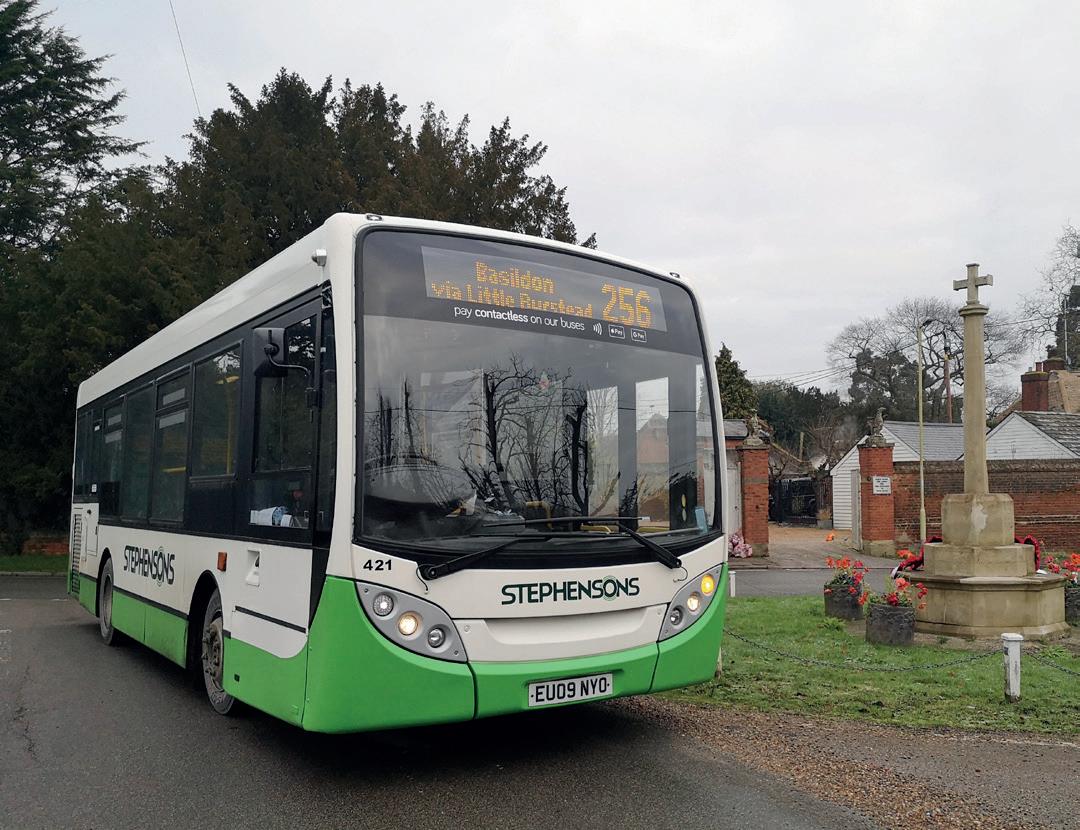
“Fuel duty would be rebated back to the level that rail pays their fuel, so zero; they don’t fuel tax and, let’s remember, neither do airlines - they’ve even had a passenger tax cut! Te government seem very concerned that current BSOG arrangements reward fuel use, so we would probably have to express the system in such a way that it wasn’t paid per litre used. But broadly operators would receive the full duty back for the fuel they consume on their services.”
2Concessionary travel to be reimbursed at 100% of the adult fare
“Tis would give operators a real incentive to grow that marketafer all, it’s quite clear that this is the one segment that really struggles post-Covid. Incidentally, my view is that if operators received a full rebate on fuel duty and also full reimbursement for concessionary travel then all other revenue subsidies for commercial bus services could just disappear overnight. Simply reforming those two funding streams could allow us to get rid of the Bus Recovery Grant, BSOG... every other little scheme out there. Depending on the fner detail, I think it would make it far easier to administer for everyone.”
3All car parking charges - both public and private - are to be linked to prevailing local bus fares
“It’s perhaps a little beyond my pay grade to work out how this could be applied to all forms of car parking, but the cost you pay to park your car would be linked to the cost of the local day bus ticket. In other words, it would cost the same to park your car as it would to buy that ticket.
“I would also add a tax on all car parking charges: I’m going to call this PAT - Parking Added Tax - and set this at 50% of the cost, but you could just pick a number. Te revenues from PAT would be given to the Local Transport Authority (LTA) and then ringfenced for use on bus service support. Alongside that, I would introduce workplace parking charges that would also go to the LTA and, like PAT, be ring-fenced for public transport support.”
4 Road User Charging
“I think this is fairly inevitable anyway, to be honest. Car tax as we know it today is on the way out. Although it’s politically unpalatable - let’s stop putting of the inevitable!”
5
LTAs are required to report KPIs for average bus speeds
“Tis might be done by route or by area or by measuring a gradual improvement, but somehow there would be a key performance indicator of the average bus speed and there would

6All new residential and commercial developments over a certain size have to contribute towards public transport provision
“Efectively I’m taking the Section 106 system and beefng it up by making it a statutory, codifed requirement. I’d have it based on some form of standardised funding formula and then make each scheme run for a minimum of 10 years. No more piecemeal bits of funding from developers for public transport.”
7School start and finish times to be staggered “Tis would help us to fatten out the peaks that we as operators all have to deal with. It would also help us to make more efcient use of our resources. Cue an outcry from parents! It could be a tricky one to introduce as it would mean working with devolved academies, but I think we just need to get people talking.”
8A proper investigation into the hidden costs of social isolation
“I think we all have a feeling that there is an impact on health and social care budgets when bus services are removed from local areas and rural areas in particular, but there’s no defnitive proof. Tere are still so many people who don’t drive who end up completely trapped in their homes because the bus service is removed and we need to quantify the cost of that. Once we know what it is, I’d take the equivalent fgure from the health and social care budget and hand it over to the LTA where it would be ring-fenced for supported bus services.”
9
LTA budgets would have to include a fixed percentage that would be spent on sustainable transport each year
“I’m taking the overall budget here, so I’m including the bits of the highway budget that pay for repairing potholes and the like. If your local authority has a total budget of £100m for transport, for example, if the fgure was 10% of that, then there would be £10m for sustainable modes.
“Within that allocation, the amount allocated to each mode would be in proportion to usage. My reasoning for that is so it isn’t all spent on cycling! When you measure usage there may be 900 people using the bus and 100 people cycling, so in that case, I would ensure that 90% of the funding goes to the bus and 10% to cycling.” 10
Local Transport Boards to agree and allocate funding for public transport in their area
“We’ve sort of achieved this with the Enhanced Partnerships process in England, but I’d bring together LTAs, stakeholders and operators to decide where all of the funds raised from some of the points above are spent. My point about a statutory requirement to raise bus speeds would be a good starting point for discussions!”
Slipping his notepad on the table, Hiron points to his 10 policies and has only one thing to add:
“Good luck with that!”
7 Bill Hiron
be a statutory requirement for that to be improved each year.”
Stephensons has over 130 buses. Hiron foresees issues switching to zero-emission
“There are still so many people who don’t drive who end up completely trapped in their homes because the bus service is removed and we need to quantify the cost of that”
SINCE WE LAST MET
Some of the key events amongst the membership in the 12 months since the last ALBUM conference
TRANSDEV / CARDIFF BUS BUS OPERATORS USE FUEL PRICES TO LURE MOTORISTS
In early summer last year, soaring fuel costs and the wider cost-ofliving crisis saw bus operators target motorists with marketing campaigns that highlighted the saving that could be made by using buses.
Transdev Blazefeld placed advertisements on fuel pump nozzles on petrol station forecourts. With the average cost of a full tank of petrol rising to over £100, these advertisements displayed the cost of travel on local bus services and urged motorists to “read the signs”.

A campaign by councilowned Cardif Bus also urged motorists to “switch to bus and beat the fuel price hike”. Cardif Bus commercial director Gareth Stevens said: “Whilst costs at the pump continue to rise, we remain committed to ofering our
customers the best possible price on travel and delivering a topquality service during a turbulent time.
JULY
SCOTTISH COUNCILS CAN CREATE NEW MUNICIPALS
In July, Scottish transport minister Jenny Gilruth said that she wanted local authorities to use new powers, introduced the previous month, to operate bus services.
Te UK Government’s Transport Act 1985 prohibited councils from establishing bus companies. Existing municipallyowned companies were allowed to continue but most have ceased to exist. Lothian is one of the exceptions and it is the UK’s largest municipal bus company.
Te Transport (Scotland) Act 2019 includes a provision for any local transport authority to operate services using vehicles that require a PSV operator’s licence. Te authority must be satisfed
that providing such a service “will contribute to the implementation of their relevant general policies”.
Tere was a long delay in implementing this part of the legislation, which the Scottish Government attributed to staf being temporarily redeployed to deal with matters relating to the Covid-19 pandemic. Te powers came into force on June 24, 2022.
Labour MSP Neil Bibby asked Gilruth whether she wanted councils to use the powers and whether she agreed that “the bus market is broken beyond repair and that councils must take back
control of bus services?”
She replied: “Yes, I want local councils to run their own services. Why else would I stand here talking about the powers in an Act that gives local authorities the power to do so?”
AUGUST
YELLOW BUSES
BOURNEMOUTH-BASED YELLOW BUSES CEASED OPERATIONS
Bournemouth-based Yellow Buses ceased operations on August 4 afer the administrator, Milsted Langdon, admitted it had been unable to fnd a buyer for the beleaguered former municipal bus operator as a going concern.
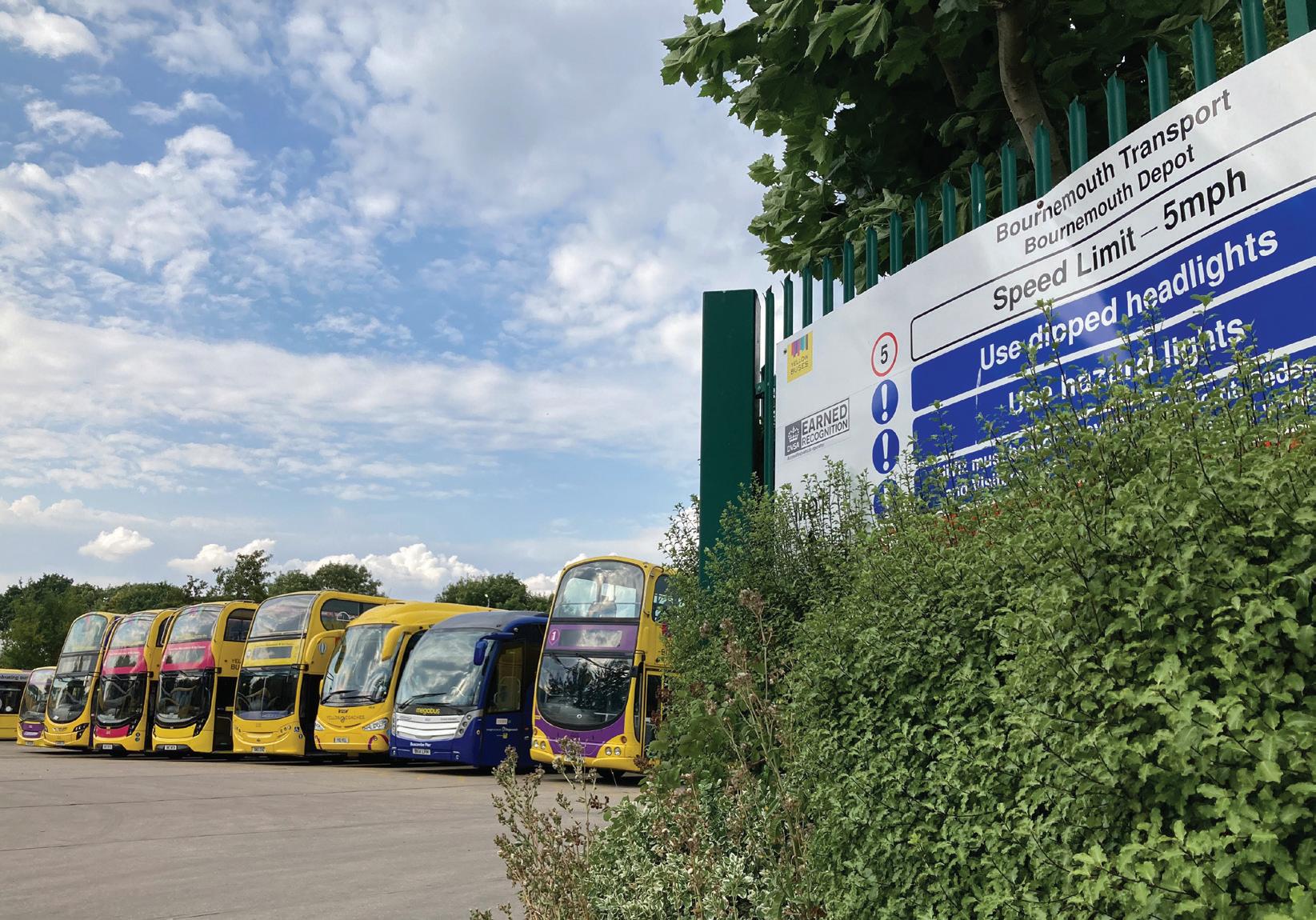
Te operator went into administration on July 29 citing challenges surrounding the fallout from the Covid-19 pandemic and cost infation. Te operator had celebrated its 120th anniversary just days earlier.
Te closure of Yellow Buses saw local rival and long-time competitor More Bus, which forms part of Go-Ahead’s Poolebased Go South Coast subsidiary, mount an almost military-style operation to plug the gaps in Bournemouth’s bus network.
Te company created a recruitment production line at a local hotel on the morning of August 5 to process Yellow Buses staf looking to join More Bus. Tose able to start immediately were ofered a £3,000 welcome bonus and by the end of the day, more than 100 Yellow Buses staf had agreed to join More Bus. A replacement network commenced the following morning with printed timetables available on all buses and at all bus stops.
MIDLAND CLASSIC ROTALA SNAPS UP MIDLAND CLASSIC
8 JUNE
AIM-listed bus group Rotala broke into the East Midlands bus market with the purchase
The ALBUM Report 2023
Bournemouth-based Yellow Buses ceased operations on August 4, days after celebrating its 120th anniversary
Cardiff Bus sought to attract motorists
of Burton-on-Trent-based independent operator Midland Classic in August.
Te purchase followed the acquisition of West Midlands bus operator Claribels and the local bus services of Henley-inArden coach operator Johnsons earlier that year.
“Midland Classic is a sizeable well-established business in an attractive bus territory,” said Simon Dunn, Rotala chief executive. It represents the entry by Rotala into the East Midlands which is a new market for the group. However, at the same time, geographically it is adjacent to our existing operations in the West Midlands and so easily managed from there.”
Te 60-vehicle Midland Classic operation was formed by James Boddice in 2005 with a pair of Routemaster buses operating on private hire. Te company later expanded into local bus service operation but in 2016 it acquired Arriva’s depot and local bus network in Burton, a move that doubled the size of the operation.
“Afer much consideration, we have decided to accept an ofer from Rotala Plc,” said Boddice. “I’d like to thank everyone who has contributed to the success of the company, especially our employees, and wish everyone well for the future.”
McGILL’S MCGILL’S BUYS FIRST SCOTLAND EAST BUSINESS
First Bus completed the sale of its First Scotland East business and all its routes in the region to McGill’s Group in August.
Te deal included all First Bus depots in Livingston, Larbert, Bannockburn, Balfron, as well as the Edinburgh open-top bus operation Bright Bus Tours. It included over 200 buses and approximately 550 staf

“Everyone at McGill’s Group is excited about welcoming Scotland East into our stable and the opportunities that lie ahead,” said James Easdale, chairman of McGill’s Bus Group. “Our team are passionate about using our expertise to build the business in the years ahead so we can retain
and attract new passengers across the region. We’re pleased the opportunity has arisen to acquire the business and we appreciate the eforts of First towards ensuring a smooth transition.”
Owned by businessmen Sandy and James Easdale, McGill’s was already the largest independent bus operator in the UK with a feet of approximately 440 vehicles. Tis includes the Xplore Dundee business purchased from National Express Group in January 2021.
SEPTEMBER
LOTHIAN SARAH BOYD IS THE NEW LOTHIAN BOSS
Sarah Boyd was appointed as the new managing director of Lothian, the UK’s largest remaining municipal bus operator, in September.
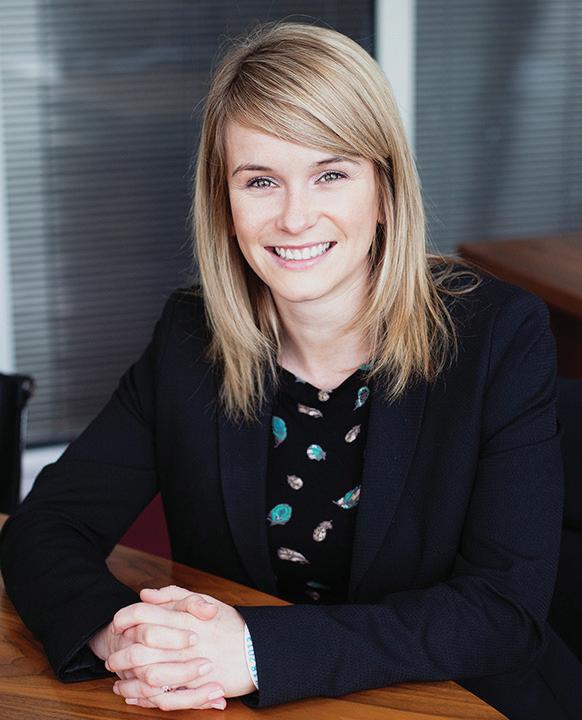
Boyd moved on from her role as operations director to replace former boss Nigel Serafni, who had retired from the Edinburghbased business afer 21 years of service. Her appointment represented a shif in direction for the business, keen to move on from the struggles of the pandemic and continue to contribute to a more sustainable, greener city. As the frst female managing director of Lothian, Boyd hopes to promote a fair, people-focused and inclusive workplace culture.
Lothian chair Jim McFarlane, commented: “With a strong record as Lothian’s operations director, I’m sure [Sarah Boyd] will be at the forefront of Lothian’s resurgence as the industry leader we know it to be ... Having navigated the challenges of the global pandemic, Lothian is now on a strong path for recovery and we look forward to a bright future under Sarah’s stewardship.”
DRM BUS DRM BUS PROPRIETOR DAVID MORRIS DIES
Tributes were paid to veteran independent bus operator David Morris who passed away on September 11.

Morris, who famously described himself as “just a little country lad”, was the proprietor and managing director of Bromyardbased DRM Bus. He was well known within the industry for his passionate advocacy for the independent bus sector.
A member of ALBUM, the Confederation of Passenger Transport and the Omnibus Society, Morris was a regular attendee at the All Party Parliamentary Passenger Transport Group and he was known, and respected by many MPs, members of the House of Lords and government ministers.
But Morris was also well known within his local community where he was a member of the Bromyard town twinning committee and he even switched on Bromyard’s Christmas lights one year. Community and industry came together at his famous DRM Bus hog roast events.
McGILL’S / LOTHIAN BUSES MCGILL’S IS SCOTLAND’S PUBLIC TRANSPORT OPERATOR OF THE YEAR
McGill’s Bus Group was named Public Transport Operator of the Year at the Scottish Transport Awards in September. Lothian Buses was highly commended.
Lothian also scooped the Excellence in Accessibility Award; Scottish Citylink was named Best Bus Service.
OCTOBER NCT NCT ORDER FIRST ELECTRICS
Nottingham’s historic Trent Bridge Bus Garage, once home to horse-drawn trams, was given a new zero-carbon future when council-owned Nottingham City Transport ordered its frst electric single deck buses and appointed
9
Review 2022-23
McGill’s Group completed the purchase of First Scotland East in August
Sarah Boyd became MD of Lothian Buses
Much missed: DRM boss David Morris
Zenobe Energy as the delivery partner for the electrifcation of 78 buses.
Zenobe, a leading EV feet and battery storage specialist, was contracted to supply the charging infrastructure to the garage. Pelican Bus & Coach was to deliver the frst 12 fully zeroemission Yutong electric buses to join the NCT feet in 2023.
Tis £34m project is supported with £15.2m from the Department for Transport’s Zero Emission Bus Regional Areas (ZEBRA) Fund.
NOVEMBER
BLACKPOOL TRANSPORT BLACKPOOL WINS BUS OPERATOR OF THE YEAR
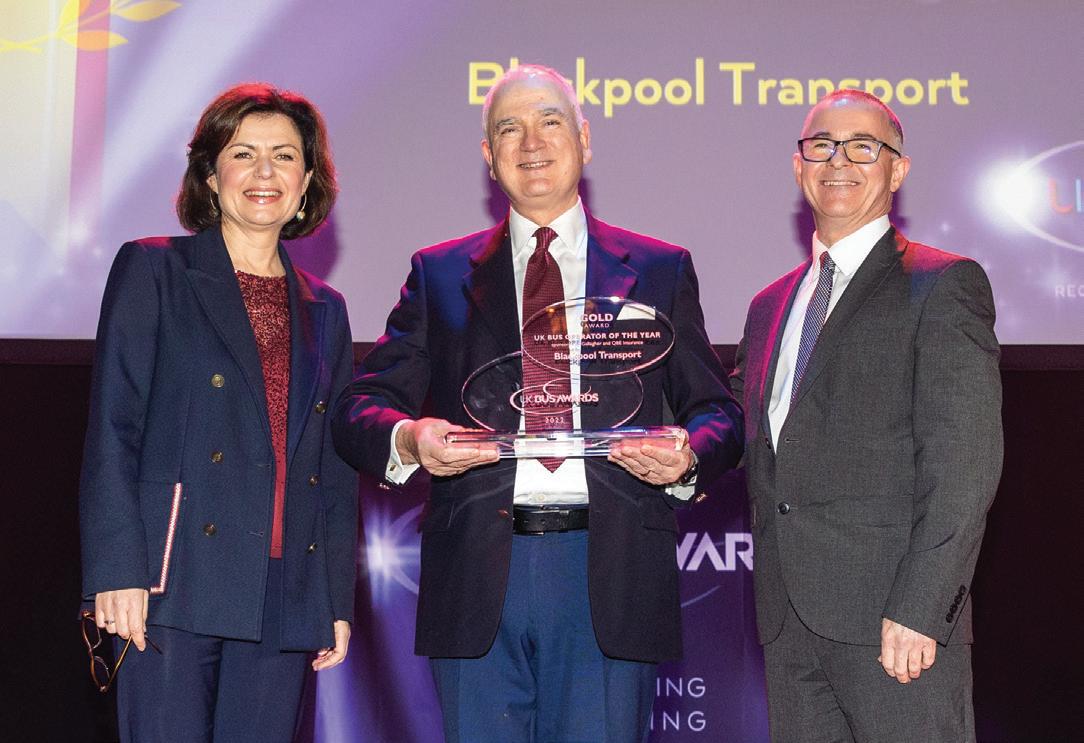
Blackpool won the coveted UK Bus Operator of the Year Award at the UK Bus Awards in London in November. Te company was also named the winner of the Gold Award in the Top Shire Operator category before fending of competition from Diamond Bus North West and Hertfordshirebased operator Uno to win the top gong in the Grand-Prix competition that pits the winners of the Top City, Top Shire and Top Independent Operator Awards against one another.
Blackpool’s win followed a pause by the industry’s premier awards scheme over the last two years as a result of the Covid-19 pandemic.
It was also a rewarding afernoon for Nottingham City Transport bus driver Jonathan Smallman. He took the gold in the Top National Bus Driver: Te Chris Moyes Memorial Award category, marking the fourth time a bus driver from the councilowned bus company has won the gold at a UK Bus Awards ceremony.
Jim Torpe, managing director of Uno was the gold winner of the Leader of the Year award.
Transdev also had some notable successes, taking golds in the Buses for Pleasure sponsored and Culture Change categories. Te Harrogate-based frm also took silver awards in the Marketing, Partnering for Delivery and Supporting the Customer Experience categories.

SCARLET BAND CENTURY-OLD COUNTY DURHAM FIRM CLOSES
In November, County Durhambased Scarlet Band ceased operations afer 101 years.
Proprietor Graeme Torrance cited rising costs and staf shortages as contributing towards his decision to close the independent bus operator afer 15 years of ownership.
Te company was established in 1921 by Sidney Blenkinsop and although it originally started as a taxi operator, Scarlet Band quickly moved into the commercial sector, running buses from 1925.
Te West Cornforth-based frm remained with the Blenkinsop family until Torrance acquired the business in 2007. Since then he has expanded Scarlet Band until it operated around 40 vehicles and had 60 members of staf Te company operated a range of contracted services largely
for Durham County Council, including the Durham Park and Ride service.
While he paid tribute to his workforce and passengers, Torrance said he felt the company could no longer continue to provide full, reliable services due to the strain on its fnances.
“Over the last couple of years we have struggled with a shortage of skilled staf, shortage of spare parts, increasing fuel prices, increasing tyre prices, increasing utility prices,” he said. “All of that put a strain on the company.”
Torrance added it felt like the right time to call it a day.
“All the drivers are guaranteed jobs,” he said. “I thought that was the responsible thing to do to ensure all my staf were guaranteed a job and that’s why we didn’t also try and do these contracts and struggle to do them.
“Our customers would have sufered with a performance that was below the usual standard.”
NEWPORT TRANSPORT NEWPORT LEADS THE ELECTRIC REVOLUTION
In November, Newport Transport announced plans to make Newport the frst city in the UK with a fully electric bus and coach feet by the end of 2023.
Te company was already poised to start running Wales’ frst electric coaches. Te feet was to include four fully electric Yutong TCE12 coaches. Te delivery of a further 12 Yutong E10 & E12 electric buses would take the EV bus feet to 44 electric buses.
Te expansion would make up 44% of Newport Transport’s overall bus feet, the largest ratio of electric to diesel buses in a feet outside of London.
Scott Pearson, managing director at Newport Transport, said: “I am passionate about quality public transport, but I am even more passionate about the environment. We must make these kinds of changes now, for our planet, and keep moving things forward despite funding being tight. At Newport Transport, we’re showing what’s possible, despite being a smaller municipal operator.”
DECEMBER
ROTALA ROTALA WINS GREATER MANCHESTER CONTRACTS
Te frst step towards dismantling deregulation in Greater Manchester took place on December 23 when Andy Burnham, the region’s mayor, announced the winners of the frst contracts under the region’s new franchising regime.
Te contracts relate to so-called ‘Sub-Area A’, covering the north west of the region and include Wigan, Bolton and parts of Bury and Salford. Te new Bee Network in those areas will commence on September 24, 2023. Go-Ahead Group was a big benefciary with its Go North West business winning the frst two large franchise contracts in Wigan and Bolton.
Rotala-owned Diamond Bus lost out on both of the large contracts but managed to secure seven small contracts.
10
The ALBUM Report 2023
Blackpool Transport was named Bus Operator of the Year Award at the UK Bus Awards
McGill’s was Public Transport Operator of the Year at the Scottish Transport Awards
“In 2023, in partnership with the Mayor, TfGM [Transport for Greater Manchester] and GMCA [Greater Manchester Combined Authority], we will be stepping up the quality on over 40 bus routes in Greater Manchester, supported by our team of over 250 colleagues and 80 buses,” he said Bob Dunn, managing director of Rotala’s Diamond Bus operation in the north west of England.
In an announcement to investors, Rotala went further, revealing the contracts have a combined annual revenue of approximately £18.7m and each are for a period of between three and fve years.
FEBRUARY
ENSIGNBUS ESSEX OPERATOR ENSIGNBUS IS SOLD
In February, surprised the industry by announcing a deal to acquire Essex-based bus operator and dealer Ensignbus. Te group said the purchase of the business would not only strengthen its existing bus operations in Essex, but also “provide a number of synergies and value accretive growth opportunities in the B2B and bus vehicle dealership markets”.
Te company was formed in 1972 by Peter Newman and expanded rapidly in the late 1970s when it acquired over 2,000 Daimler Fleetline double deckers that London Transport had branded as unreliable and troublesome. Ensignbus made its name refurbishing the vehicles and then selling them to operators both in the UK and elsewhere. Expansion into sightseeing services and local bus operations followed.
Ensignbus is still owned by the Newman family and operates a relatively youthful feet of 55 buses. As well as a growing commercial bus network in South Essex, Ensignbus also provides rail replacement and private hire contract services. Te Newmans are to retain ownership of the Ensignbus heritage bus feet.
In the year to December 31, 2021, Ensignbus reported a turnover of £26.7m, a respectable operating proft of £8.6m and relatively little debt.
IPSWICH BUSES DAN BASSETT IS NEW IPSWICH BUSES MD
Council-owned bus operator

Ipswich Buses announced the appointment of Dan Bassett as managing director in February. He will join the operator in May following the decision by Heath Williams to retire from the role.
Bassett will join Ipswich Buses
from fellow municipal Reading Buses, where he is service delivery director. In his new role he will take up the reins and provide leadership to 150 members of staf and provide strategic and operational direction for the 80-vehicle operator.
Commenting on his new role, Bassett said: “I am really looking forward to joining Ipswich Buses and continuing its rich, 120-year history of delivering for

its customers and contributing to the success of the town.”
MARCH
TRENTBARTON MORGAN TAKES THE REINS AT TRENTBARTON PARENT

Trentbarton commercial director Tom Morgan stepped up to a new role as managing director for all of Wellglade’s bus operations.
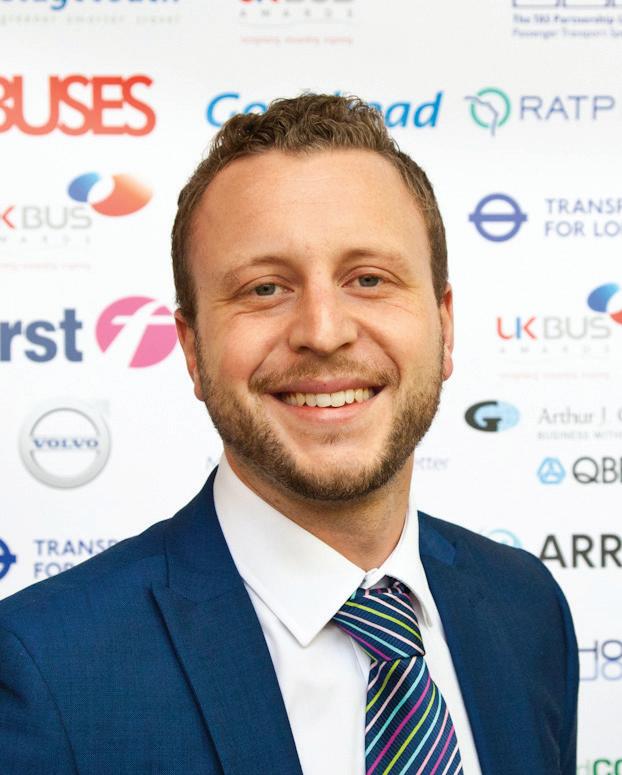
Te move followed the retirement of Trentbarton and Kinchbus managing director Jef Counsell afer almost half a century in the bus industry. Wellglade bus operators also include Midland General, Notts & Derby and TM Travel.
Wellglade chairman Brian King said Morgan had gained wide experience of the group since joining the business in 2009.
He added: “Alongside the recent arrival of John Bickerton as group engineering director, the group is now better positioned for our operators to create synergies and seize new opportunities.”
Refecting on his retirement, Jef Counsell said: “I’m still in contact with people I worked with in the 1970s and those connections run deep across the industry. Bus operators are nothing without their people and that’s been central to running Trentbarton. I leave very optimistic that public transport has a great future.”
APRIL
WARRINGTON’S OWN BUSES WARRINGTON’S OWN BUSES MOVES INTO NEW PURPOSE-BUILT DEPOT
Work was completed on Warrington’s new bus depot in April, with Warrington’s Own Buses now operating from the new facility, which is ready to support a fully electrifed bus feet in line with the council’s zero emissions buses plans. Funded by Warrington Borough Council, the government’s Town Deal Fund and the Getting Building Fund, the facility forms an important part of Warrington’s plans to invest in the town’s bus service.
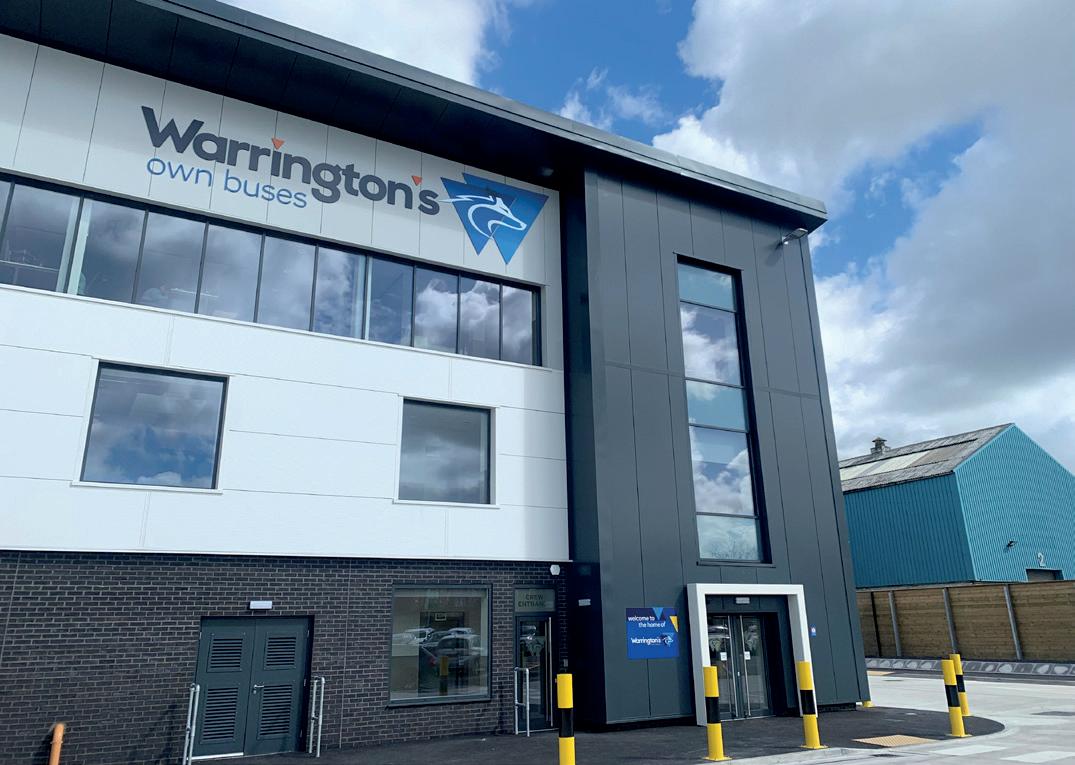
11
Review 2022-23
Dan Bassett will soon head Ipswich Buses
Jeff Counsell retired in March
Tom Morgan became MD for all of Wellglade’s bus operations in March
Work was completed on Warrington’s Own Buses new bus depot in April
A POSITIVE PLATFORM FOR GROWTH
Sarah Boyd wants her tenure as managing director at Lothian Buses to represent a positive shift in direction. Robert Jack spoke to her
Ithink this is going to be a really great summer for Edinburgh, for loads of reasons,” says Sarah Boyd.
It certainly seems like things are starting to come together for Lothian Buses, the UK’s largest municipally-owned bus company.
Major infrastructure projects that have presented ongoing operational challenges will be fnished before the summer. Te extension of Edinburgh’s tram line from the city centre to Newhaven is nearing completion, and North Bridge, an important cross-city link, will soon reopen to northbound bus services.
A severe shortage of drivers that forced Lothian to cancel services has now eased thanks to a comprehensive efort by the company to improve the recruitment and retention of staf
Although patronage continues to lag behind pre-pandemic levels, 85% of weekday patronage has been recovered and this rises to the mid-90s on weekends. Tis recovery has been aided by the Scottish Government’s introduction of

free bus travel for those aged under 22.
And, as summer approaches, there are signs that international tourism is once again booming in the Scottish capital - in addition to staycationers - bringing a welcome economic boost to the city and its local bus company.
While acknowledging that there are still challenges, it’s no surprise that Boyd is excited about the opportunities that will arrive this summer - and beyond. But it’s also an exciting time for Boyd personally. It’s now been eight months since she took over as managing director of 700-vehicle Lothian, becoming the frst woman to hold the top job. She
replaced Nigel Serafni, following his retirement, moving up from her previous role as operations director.
While Serafni steered Lothian through the pandemic, Boyd’s appointment as MD represents a shif in direction for the business, keen to put the struggles of the pandemic in the rear-view mirror and contribute to a greener and more sustainable Edinburgh.
GOING FOR GROWTH
Te Covid experience has lef a legacy of changed travel patterns. Commuting has reduced with many workers having switched from ofces to home and hybrid working in the wake of the pandemic, but this is not true on all routes. Some, such as those serving hospitals, now have peak loadings that resemble what they did previously.
Boyd suggests that those who have been cooped up at home for all or most of the week are perhaps even keener to get out at the weekends, and many of them are choosing to travel by bus.
A service change will be implemented between the end of May and mid-June that will refect changed travel patterns, providing frequency improvements where they are required. Buses and drivers that have been bogged down in congestion and lengthy diversions caused by the tram works and partial closure of North Bridge will be reallocated in the pursuit of growth.
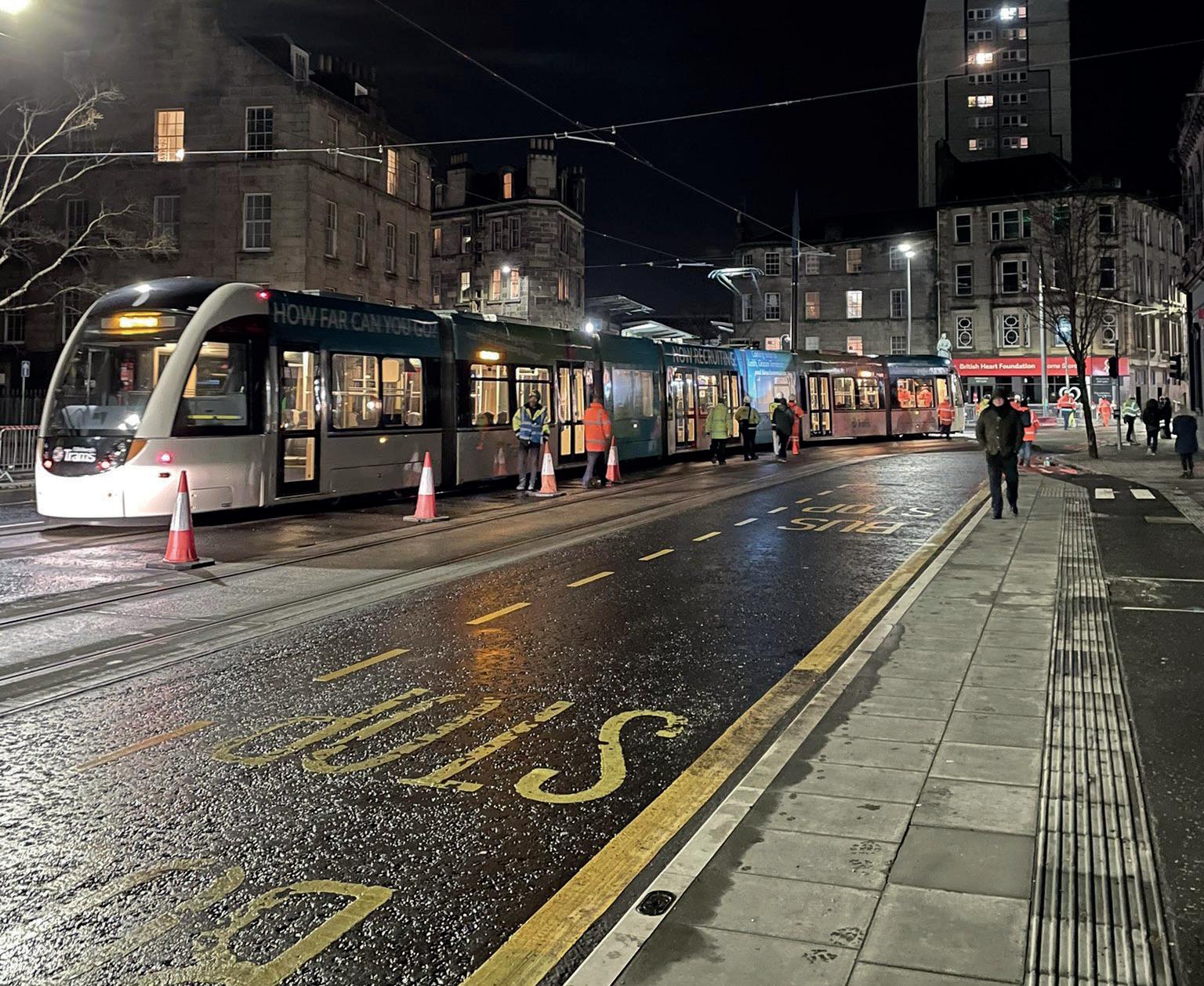
Residents and visitors are meanwhile enjoying the convenience of capped contactless payments system - TapTapCap. Lothian became the frst operator in Scotland to introduce fare capping back in July 2019 and Boyd hails the project as “one of our biggest success stories of the last few years”.
“It’s phenomenal when we
see where it’s gone and just how popular TapTapCap is becoming,” she says. “It’s the simplicity of that. It’s just so easy to use.”
It’s just one of the components which Boyd and her colleagues believe can help propel them towards achieving their 2023 Business Plan targets of growing patronage and farebox revenue.
Refecting on the situation that Lothian has navigated since trafc returned to Edinburgh’s streets, Boyd says: “It’s testament to the team efort and ethos that we’ve continued to operate in the way we have throughout this time, and we have grown our passenger numbers back.
“It’s not been an easy time to be a bus driver in Edinburgh, that’s for sure, or indeed anybody at Lothian ... Te delays and the congestion that we face have probably been busier than I’ve ever seen it, and I’ve been at Lothian for 10 years this year. Tere’s a lot to be said for
12
The ALBUM Report 2023
After years of delay and disruption, trams are now being tested on Leith Walk
“It’s testament to the team effort and ethos that we’ve continued to operate in the way we have throughout this time, and we have grown our passenger numbers back”
Sarah Boyd has now spent almost 10 years at Lothian Buses, and eight months as the company’s managing director the efort that’s gone into getting this far.

“Hopefully we will lif our head on a lot of that, but it’s an exciting, vibrant city - there’s always going to be economic growth and development.”
Boyd is in continued conversations about competition for roadspace.
“On key arterial routes now, in some cases there is so much competition nothing can actually fow as it should,” she explains. “We’ve had some good discussion now on the application of the transport hierarchy. In some places it’s possible to give everybody - whether that’s cyclists, pedestrians or bus passengers - what they want, but actually more ofen there needs to be some kind of, I guess, common sense view of that.”
Boyd is reminding City of Edinburgh Council, and others, that “every bus passenger is a pedestrian at some point”.
She continues: “I think when you go back to the height of the pandemic when there was a lot less trafc on the road and people’s journey patterns were very diferent, there was a good argument for the measures that had been put in place ... But we are now looking to the future. We are trying to reduce car usage, trying to grow modal shif. How do you get that? You get that by making that a good experience for the customer. It’s got to be that the journey is something you choose, you want to do and it makes sense for you.”
DRIVER SHORTAGES
Lothian’s forward momentum is helped greatly by now having a full contingent of just under 1,800 drivers. Driver shortages have plagued the bus industry and Boyd says it was an enormous problem for Lothian that peaked towards the tail end of last year.
“We ended up losing mileage and that’s not something any bus operator does willingly,” she says. “Everybody goes out driving before you lose miles for not having drivers ... My worry was always that people then just get used to managing that problem. Our people are very, very good at reacting to anything - all sorts of stuf happens on any given day. So that just becomes another thing that people have to deal with. So it was great to
turn the corner on all that, which we have.”
To counter the problem, every avenue was explored. Te company advertised bus driving as a career on billboards and on the radio. It also hosted ‘try-a-bus’ open days at garages.
To persuade existing drivers to remain with the company, work has been done to improve work-life balance. Four-day rotas have been introduced into all the garages and are proving successful. A healthcare ofering is provided, including dental and physio treatment. And the company’s privilege pass is now ofered to any family member or friend, providing a year of unlimited bus travel for £60 instead of £650.
Driver pay has also increased. Last year saw an 8% pay deal agreed for Lothian’s City garage, which means that afer three years of service a driver receives £32,000 before overtime.
“Lothian has always been able and fortunate to be amongst the best payers in the industry,” says Boyd. “I think that plays a big part in us being able to recruit, retain and attract good talent in the frst place.”
Tis comprehensive approach to the recruitment and retention problem has worked, and Lothian is now covering all of its mileage again.
GOVERNMENT SUPPORT
Scottish bus operators became the frst in the UK to return to normal funding arrangements following the Covid-19 pandemic at the end of March afer the Network Support Grant Plus (NSG+) scheme was wound down.
Before Covid, Scottish operators received funding via the Bus Service Operators Grant (BSOG). However, since March 2020, Transport Scotland has administered emergency support through the Covid-19 Support Grant (CSG) and Covid-19 Support Grant - Restart (CSGR), which both ended on March 31, 2022.
Te Network Support Grant was introduced as a successor to BSOG with NSG+ designed to bridge the gap from the winding down of Covid restrictions to
13 Sarah Boyd
“We are trying to grow modal shift. How do you get that? You get that by making that a good experience for the customer. It’s got to be that the journey is something you choose”
normal operation. Te Scottish Government had originally planned to end the NSG+ scheme in October last year but later decided that it would be extended until March 31, 2023, albeit with reduced payments.
Boyd is relaxed about the end of this support. Bus operators had warned that winding down the scheme while bus patronage remained below pre-Covid levels could lead to fare increases and widespread service cuts. Lothian implemented a fares increase on April 2 - the frst in three yearswith a single fare rising by 20p to £2, and a day ticket rising by 50p to £5.
NSG+ has gone but Boyd welcomes the push that has been provided by the Scottish Government introducing free travel for those aged under 22. While older concessionary travellers have been relatively slow to return to buses, perhaps still fearing being in close proximity to others, younger concessionary travellers are enjoying the freedom to make as many free journeys as they like. In Edinburgh, around threequarters of those who are eligible now have a card.
Additionally, the Scottish Government is launching an advertising campaign to get back on the bus. “Tey need to reverse
PROFILE: SARAH BOYD
In the final year of a mathematics and finance degree at Heriot Watt University, Sarah Boyd thought she would end up working in financial services in Edinburgh - until she came across an advertisement for Stagecoach’s graduate scheme.
Having grown up in Dundee, she was aware of the Perth-based group and everything that its co-founder, Sir Brian Souter, had achieved. She did some research and she soon realised that the bus industry would be more about people than anything else, which was exactly the kind of environment she wanted to work in. She applied and joined the scheme in 2002.
Boyd held various positions within
engineer all of the messaging,” says Boyd. “Bus was used during the pandemic as this illustration of somewhere to avoid, when actually we were clearly following the government guidelines.”
Instead of pushing for a further extension of NSG+ support, Boyd wants dialogue with the government around reviewing the rate of reimbursement for concessionary travel and the 14.4p per kilometre NSG rate that is paid to bus operators. Despite signifcant increases in bus company operating costs, the rate has remained unchanged since its introduction in 2012.
Boyd wants these conversations to be accompanied by a wider discussion about how the government can work with the industry to deliver its climate change and modal shif targets, such as reducing car kilometres by 20% by 2030 and achieving net zero by 2045.
AN EXCITING TIME
Boyd sees big opportunities ahead for Lothian. Tram shadow running began down Leith Walk in March ahead of the opening of the extension that will take the line through Leith and on to Newhaven. Te tram is separate from Lothian – although the council has plans to bring them
LOTHIAN KEY FIGURES
2 million+ journeys every week
67,000 daily app users
67 bus routes

700+ vehicles
100+ years old
8 depots
2,300 colleagues
4 TravelHubs
both together – but Boyd sees its arrival as an opportunity to take buses of the Leith Walk corridor and reinvest them in the rest of the network.
She explains: “You look at development in Edinburgh ... Tere’s so much good, exciting economic growth there that we have to serve. We have to provide a sustainable way of travelling And that means continually growing the network.”
Te past decade’s expansion has taken Lothian eastwards with East Coast buses and westwards with Lothian Country. Tey are two very diferent businesses. Boyd says that East Coast Buses has recovered well. Lothian Country is on the right track following a consolidation last November, but growth will take longer.
Te booming tourism market in Edinburgh meanwhile presents a mouth-watering opportunity for Lothian’s Edinburgh Bus Tours and Lothian Motorcoaches subsidiaries, as well as its core bus business.
“It’s an exciting time,” says Boyd. “It’s a great time to be doing this job. It’s not that there aren’t challenges, it’s not all rosy, but I think that now we are fnally emerging from the pandemic, it is a real opportunity for Lothian.”
director in 2017.
Boyd says that she loved her time at Stagecoach but “here it’s within my gift now to really make a difference, to really do a good job”. Lothian, the UK’s largest municipal bus company, requires her to balance strategy with day-to-day operations, providing a good grounding for both.
“You’ve got this understanding of the whole thing, the end-to-end process of everything that we do,” she says. “It’s just easier to make it all happen.
singles out former operations director Bill Campbell and former engineering director Bill Devlin as examples.
“The opportunity to work with these guys was something that was really important to me, and these are people that have had a big influence on me,” she says.
“Having the opportunity to work with them has been a huge part of my own development.”
Stagecoach, including being part of the service that it delivered for the 2012 Olympic Games in London. The group were disappointed to lose one of its rising stars when she joined Lothian as head of operations in 2013, later becoming operations
“Lothian is big enough to deliver in the way we do, both financially and the actual customer offering, but then it’s also small enough to still properly keep a grip of.”
Lothian also offered Boyd the opportunity to work closely with some experienced bus people, and she
Almost a decade after joining Lothian, Boyd is now its managing director and, in addition to growing the business, she hopes to promote a fair, people-focused and inclusive workplace culture.
Commenting on her new role, she says: “Having spent nearly 10 years in the business and understanding it in the way I do, it’s a privilege in many ways.”

14 Sarah Boyd






















































































make journeys easier and faster with Simple ticketing & payments
in touch
ticketing
payments
ABT
We
Get
Account-based
Open
Multimodal
Mobility-as-a-service
PROUD TO HAVE CONTRIBUTED
The eyes of the world were on Edinburgh - and Lothian Buses- when Queen Elizabeth died last year, but the team rose to the challenge
It would be hard for anyone working here not to feel proud having contributed to our eforts during that period,”
remarks Willie Hamilton, Lothian’s operations director
On Tursday, September 8, 2022, Her Majesty Queen Elizabeth died aged 96 afer an incredible 70-year reign as Monarch. Everyone in Britain and the world over will be able to remember where they were when they heard the news. Te announcement invoked an outpouring of sadness, but for a select group of people at Lothian Buses in Edinburgh, two words rang around everyone’s minds: “Operation Unicorn”.
Operation Unicorn was the ofcial plan put in place should the Queen pass away in Scotland. As Her Majesty had died at Balmoral Castle in Aberdeenshire, it meant that Operation Unicorn was implemented, leading to the shutdown of some of Edinburgh’s busiest roads.
Hamilton had only taken on his role as operations director a few weeks previously, and yet was now front and centre of Lothian’s response to such a historic event.
“Operation Unicorn was a piece of work which was probably about fve-to-six years in the making,” Hamilton explains.
“Years and years of planning went into this, with lots of people involved in the Edinburgh Working Group including Lothian, the City of Edinburgh Council, Police Scotland and other key partners in the city.
Lothian was at the forefront of this planning; its expertise included its knowledge of its network as well as having experience with passenger fows and movement at big events.

“It was our responsibility to take charge of what we do best, just like the council and the police and
others would do with their own responsibilities.” Hamilton says.
“We moved quickly to establish a core group of individuals from operations, engineering and other support teams, who could lead their teams through the diferent phases of this event.”
Despite the Queen’s cofn not due in Edinburgh until Sunday, September 11, protocols in efect on the Friday and Saturday, September 9 and 10, meant Lothian’s network was signifcantly disrupted over the weekend.
DEALING WITH DISRUPTION
During those two days, the world descended upon Edinburgh’s streets, hoping to gain a glimpse of the cortège as it made its way into Edinburgh and then out again on its way to London.
Not only that, media outlets from around the globe ensured that for a few days, Edinburgh was the centre of the universe. 24-hour rolling news feeds followed the city’s every move.
Walter Herring, head of operational risk at Lothian, was asked by the business to look at their response to the Queen’s passing from the outside. He’s used to dealing with change and disruption throughout his career
in the bus industry, but this was diferent.
“Well, for a start, everything goes out the window at a time like this,” Herring says.
“We still had our normal service to provide, but now we had the scrutiny of the international media on us too. If anything had gone wrong it would have been front page news, so everything at that time was an operational risk to Lothian.”
Hamilton explains how Lothian maintained its service provision throughout this time:
“We made the decision over the weekend to split some of our services that would be impacted most by the road closures.

“Tis meant we ran a ‘north version’ and a ‘south version’ of each route.
“By utilising our terminus points on the outskirts of the city, we were able to keep our customers moving, taking them as far into the city centre as possible, and getting them home safely too.”
Te challenge was made even more difcult due to the ever-
16
The ALBUM Report 2023
Lothian only suffered a 3.5% decrease in customer numbers over the weekend
Lothian decided to split some of the services that would be impacted by road closures
“Everyone at Lothian took responsibility and was accountable for the business’ efforts over the course of Operation Unicorn”
changing nature of the road closures and diversions.
“Tere were over 19 changes to the plans in the four-day period,” says Herring.
“Tat is despite years and years of planning beforehand. Tere was one particular plan that Princes Street would close at 1400hrs but instead it closed at 1000hrs.
“Tis meant we had to change our services that operate in Princes Street, just about nearly all of them, to be able to provide for customers.”
ALL-HANDS-ON-DECK
Lothian also provided over 300 journeys for Police Scotland personnel throughout the weekend, shuttling ofcers in and out of the city. It was an enormous task for Lothian to take on, but one Hamilton knew they could handle:
“It was really a case of ‘all-handson-deck’ from everyone here to help with the added demand.
“Anyone with a licence was asked to do their bit to help if they could.
“None of those extra 300 journeys afected our timetabled services and
we’re immensely proud of that.”
Withdrawing services is a last resort for operators. Hamilton explains that even in these circumstances, it was never really an option:
“We probably could’ve been excused for looking at how the road closures afected our network and cutting some services.
“But that’s not who we are - we know there are people who rely on us during their day-to-day lives, and we recognised that going into the situation.”
Lothian temporarily closed down its city tour branch, Edinburgh Bus Tours, as a mark of respect for the Queen’s passing. Herring explained why that was key in helping the business play their part in Operation Unicorn.
“Our Edinburgh Bus Tours colleagues did a sterling job for the business that weekend.


“Tey helped with driving colleagues for the police shuttle buses but also their supervisory staf and customer-facing resources helped us with the large crowds that had descended upon our city.”
Herring gleams as he points out that despite the disruption, Lothian only sufered a 3.5% decrease in customer numbers and not a single blameworthy road accident, meaning it was business as usual for most of Lothian’s customers.
“Business as usual,” Hamilton remarks, is how Lothian got through the weekend. A weekend that reafrmed what he already knew about the business; that when everyone sticks together, they’ll get through anything.
Everyone at Lothian took responsibility and was accountable for the business’ eforts over the course of Operation Unicorn, which ended when the Queen’s cofn lef Edinburgh Airport on its way to London.
RESPECT AND DECORUM
Looking back at whether the project was a success for Lothian, Herring believes the company’s fexibility and resilience shone through.
“We are an incredibly resilient business,” he believes.
“We demonstrated our fexibility, and that goes right through from our executive team, to our drivers, our engineers and all of our staf
“One of the many reasons this place is so special is its people and our response in this period, well I doubt anyone in the sector has ever seen before.”
Tis period underpinned Lothian’s commitment to succeed, which each colleague across the business shares. Lothian maintained its core network amidst rolling road closures, no-go areas and an infux of tourists and visitors from all over the world.
Something which was replicated a week later by London’s transport system; however, it had a week to prepare for this. Lothian was thrust into the spotlight and got on with it, owing its resolve to the stoicism of its leadership team.
“Going in, we always wanted to play our part with respect and
decorum,” Hamilton says.
“Te reality was, it was the death of a Monarch and although the situation may change from day-today and things may get hectic, we still had to be respectful of that.”
Lothian displayed its respect via its actions throughout the period. Poignant images on Lothian’s retail screens and their social media channels were displayed throughout the weekend.
Lothian’s team knew that the eyes of the world were on them, and they wanted to get through the period without being seen.
“Tis wasn’t about us; it was about our Monarch.” Herring remarks. “Our core objective was to do all of this peacefully, respectfully and without being noticed. Just being there, because we’re expected to do so.”
And despite the gravity of the situation, and the historical undertones surrounding the period, both Hamilton and Herring took solace in the fact that they were able to do it by keeping the mood light-hearted along the way.
“Tere was a lot of goodwill among our teams and that contributed to the efort of everyone at Lothian,” Hamilton states. “You don’t get through intense situations like this without that camaraderie.”
For Herring, that goodwill kept him going throughout, even if it did interrupt his sleep.
“Tere’s only so many times you can get woken up by text messages at 5am!” Herring laughs.
“But on a serious note, that goodwill stretched out to the multi-agency discussions we were having. Tere was a real sense of everyone wanting to do not only their own businesses proud, but their city and their people too.
“I think everyone will look back at Operation Unicorn as a logistical success.”
Many lessons will be learned from Operation Unicorn, but for Lothian maybe the most important one of all was that they’re still capable of doing what they do best when required. Te events of September 2022 will be forever remembered by everyone, none more so than those who had no time to grieve or refect, but simply had to carry on doing their job.
17 Operation Unicorn
“There was a lot of goodwill among our teams and that contributed to the effort of everyone at Lothian”
TAP-TO-RIDE CITY WIDE
Edinburgh’s journey towards seamless multimodal travel
Are we nearly there yet with a connected approach to urban mobility? Edinburgh is making fast progress with the upgrade to multi-modal, account-based ticketing (ABT) across bus and tram networks.

Afer record-breaking adoption of ABT and open payments on Lothian Buses since its trailblazing launch in 2019, Edinburgh’s tram network plans to come on board to create a city-wide fare payment system. Passengers using both networks will be able to pay with a contactless bank card or mobile wallet and enjoy value from multioperator fare caps.
TRANSPORT FOR EVERY DAY AND THE EXTRAORDINARY
Te expanded, integrated system will support the strategic vision
for a world-class transport network, which prioritises social inclusion, the environment and the prosperity of the city.
Edinburgh is Scotland’s capital and a thriving European city, home to 548,000 people. It welcomes over four million visitors annually, vital for the £1.2bn annual cash injection they provide to the local economy. Many residents and tourists depend on public transport for moving around the compact city and surrounding areas, with over two million passenger journeys on Lothian Buses alone each week.
In addition, for the city to tackle issues like congestion and air pollution, it must motivate modal shif from private cars to public transport. Deeper integration of public transport in the Edinburgh city region is vital to achieving this
goal, and a seamless contactless payment experience across diferent transport modes fts neatly into this strategy.
Tere’s another big pressure point for this city in particularthe Edinburgh festivals season, which doubles its population during the month of August. Te public transport network, including more than 700 Lothian buses across more than 70 services, and Edinburgh Trams’ services from the airport to the city centre, are hit by an infux of passengers.
SMASHING TARGETS WITH OPEN PAYMENTS
Te introduction of TapTapCap on Lothian Buses, with which the operator became the frst in Scotland to introduce a ‘contactless and capped’ open payment system, was part of the strategy to deal with the challenge of keeping the city moving during the festival period.
Frictionless ticketing cuts boarding times and the clear message to ‘tap on board and always pay the best fare’ means tourists don’t need to understand the local ticketing system.
“By using open payments as the token for access, you remove one the biggest points of friction - actually getting a ticket,” says Stevie Chambers, Lothian’s head of product strategy, “Ten, with the ABT back ofce automatically applying fare caps as the passenger travels, you remove the next barrier - needing to understand the fares structure.”
Te system, developed in partnership with transport ticketing specialist Flowbird and launched two weeks before the 2019 festivals began, was a resounding success. Within one month, it processed over a million open payment transactions, demonstrating one of the fastest adoption rates of an open loop transit scheme in the world.
Says Chambers: “We set some modest targets, expecting to process somewhere between 1015% of our commercial journeys through the scheme by the end of 2019. But, with TapTapCap we didn’t so much meet our targets as completely smash them.
“Adoption rates rose to 25% of journeys at the end of the year, and have continued to accelerate. Now over half of our commercial journeys are contactless EMV taps.”
BETTER TOGETHER WITH MULTIMODALITY
With proof in numbers, the progression to a seamless, multioperator scheme across buses and trams is a natural next step for Edinburgh. Paper, smartcard and mobile ticketing are already integrated, and the addition of open payments is highly anticipated.
Launching in the near future,
18
The ALBUM Report 2023
Bringing Edinburgh Trams into an easy to manage and use multimodal ABT system with Lothian Buses is a complex project
“With TapTapCap we didn’t so much meet our targets as completely smash them”
Edinburgh Trams will ofer a Tap on, Tap of contactless open loop system. Similar to Lothian Buses, the trams will use Flowbird’s EMV enabled validators, with multi-operator fares managed by Flowbird’s CloudFare® back ofce.
For each operator, taps are aggregated, fare caps applied, fares calculated and payments handled from point of tap to settlement. A multi-operator cap will be overlaid, and revenue apportionment carried out when it’s triggered. Passengers can travel using both systems and be guaranteed they pay the best available fare for trips in a given period.
“Bringing Edinburgh Trams into a multimodal ABT system with Lothian Buses is a frst for Flowbird. It’s a complex project, but the fnished product will be simple to manage and use,” says David Tompson, managing director of Flowbird Transport.
“As well as bringing value to the operators involved and passengers, the ticketing system will be one of the most advanced in the world, helping Edinburgh to rise to unique challenges.”
PASSENGER APPEAL DRIVES BENEFITS
Te central mission for Lothian Buses’ ABT and open payment system was to achieve clear passenger approval. With speedier boarding, an easy way to pay, and straightforward messaging on fare capping, it aimed to appeal to existing and new customers.

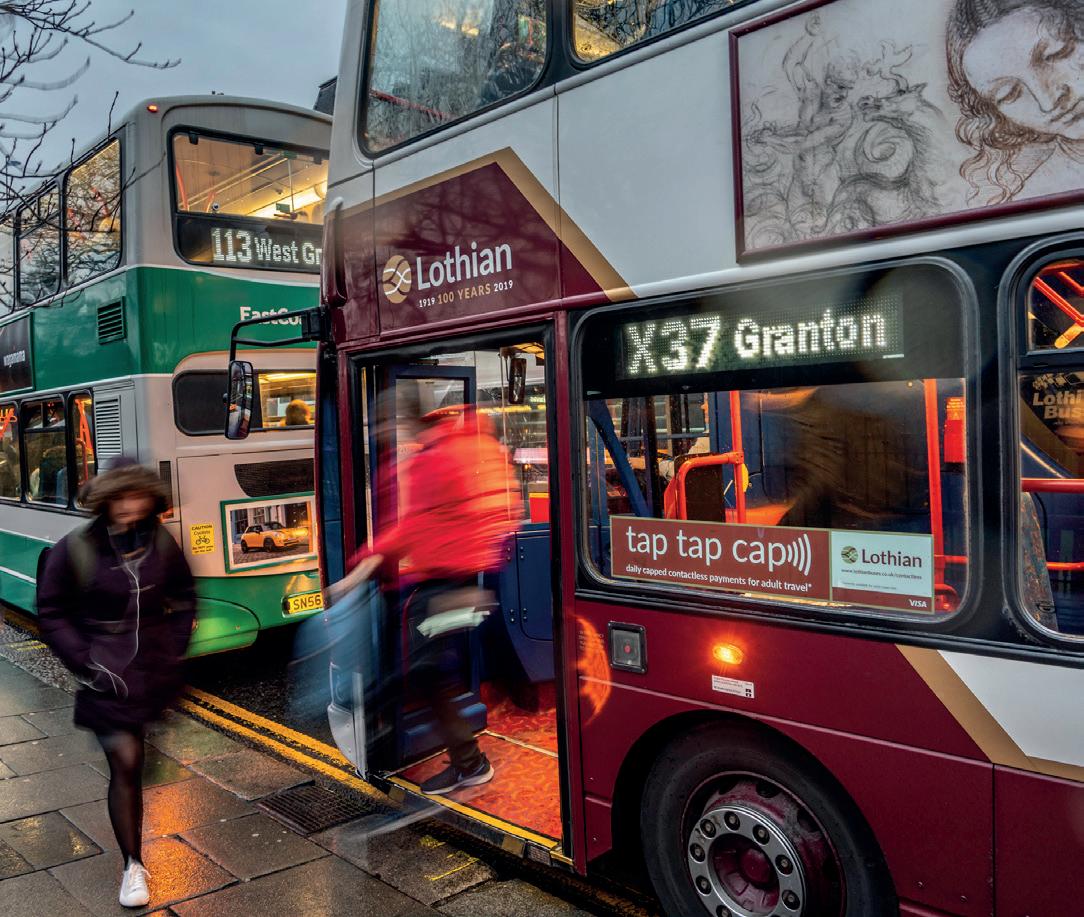
“Since launching, we’ve seen migration from cash, smartcards and mobile ticketing, highlighting the importance of convenience as a motivational factor,” says Chambers, adding: “Undoubtedly, best value capping is a compelling proposition. Not only does it remove the need to work out which ticket you need for the zones and times you plan to travel in, it fexes with you when your plans change, in a way that pre-purchase tickets can’t.”
By creating a system passengers want to use, Lothian found that it simultaneously met important commercial objectives. “Te most signifcant benefts are rightly for customers,” says Chambers, “Making it easier to choose to use
a bus is such a big part of what we do. But this, by extension, fows through to wider business benefts of growth in ad hoc journeys and overall ridership.”

Te ABT and open payment back ofce has been a source of reassuring data for the operator, providing insights that it uses to continually improve services.
Chambers comments: “Operators face signifcant commercial challenges, and in ticketing these can be barriers to deployment - What will my decline rate be? Will I lose revenue on capping? - Te data we’ve seen has validated our commercial instincts and given us confdence to do more - implementing weekly capping, for example.”
IS DESTINATION MAAS WITHIN REACH?
In cities like Edinburgh, ABT and open payments can provide a springboard for Mobility-asa-Service (MaaS), defned as the integration of transport and related services into a unifed, on-demand mobility application with a single payment channel.
For years, the industry has struggled to achieve this vision, but recently a fully-fedged whitelabel app has been developed by Flowbird that ticks all the boxes.
Te award-winning app has been used in Monaco under the Monapass name for two years, providing a single sign-on account for journey planning; booking
and payments for parking and shared mobility; and ticketing and payments for public transport and local attractions.
Says Tompson: “In the 18 months afer launch, Monapass was downloaded 24,000 times, and 68,000 transactions were processed, an indicator of the appetite for MaaS.
“Our success in Monaco demonstrates what might come next in cities that have begun to explore the benefts of ABT and open payments. A MaaS app connects the experience of using transport and mobility services, and enjoying the destination. Everyone benefts - cities, operators, local businesses and the public.”
Whatever the future direction for travel in Edinburgh, and whether or not MaaS is the destination, it’s already a poster city for transport technology and network integration.
As Chambers says: “We’ve achieved so much with our scheme but there’s always more to be done! We’re working with our technology partners to explore innovative ways in which we can broaden the appeal of our scheme to encompass other customer segments. We’ve got lots of ideas up our sleeve, so watch this space...”
Flowbird is a leading provider of transport ticketing and payment technology to cities and regions throughout the world. To discover more about their work in the transport and wider mobility space, visit fowbird.group
19 Flowbird
LOTHIAN OPEN
IN NUMBERS
journey taps +80k journey taps per day and growing 4.2m unique users 10% of journeys trigger fare caps Based on data from July 2019 until February 2023
Lothian Buses carries more than two million passengers each week
PAYMENTS
62.9m
Over half of Lothian’s commercial journeys are now contactless EMV taps
TICKETER OPENS UP A WORLD OF OPPORTUNITY
Ticketer is well known for its ticketing solutions, but it’s now expanding with new technology for operators
Ticketer has become a market leader in ticketing technology over the last decade and the company is a trusted partner for many bus operators. Its state-of-the-art cloud-based ticketing platform now supports millions of passenger journeys every day.

“Working closely with our customers is what Ticketer is all about,” says Andreea Reardon, Ticketer’s Chief Product and Technology Ofcer. “We had the mindset that we wanted to think diferently about ticketing and although we have grown and evolved over the years since we began, our products are still centred around bus operator and passenger needs.”
Richard Blackburn-Hughes, the company’s Chief Commercial Ofcer, believes that Ticketer beneftted from the clean sheet approach to technology adopted when the company was founded back in 2009. He continues: “We started with a single product and that product has been continuously improving. It has been getting better and better over time and it’s thanks to talking and listening to operators that we’ve been able to do that.”
Key to that process is that cloud-based platform that has been continually upgraded and enhanced with new features and functionality, many of which were developed as a result of operator requests. Tat close partnership working with operators across the country is now leading Ticketer to move beyond ticketing and ofer new solutions that continue to meet the needs of bus operators. Tey also promise to ofer a stepchange in how they approach their businesses.
HARNESSING THE POWER OF DATA
Bus operators are increasingly becoming more data-driven, but Richard believes that many
are only just starting to scratch the surface. He feels that data, and creating insights based on that data, can be instrumental in driving a revolution that creates improvements for operators and passengers alike.
However, with the sheer volume of data created by the average bus operator, it can be challenging for many to extract meaningful insights. Richard believes that Ticketer’s new Insights Hub will change that by providing them with access to their data quickly and easily. It will also help operators to make informed decisions about improvements or changes by interrogating historical data and travel patterns.
“Te essence of it is that operators have a phenomenal amount of data,” adds Andreea. “While traditionally we helped operators access their data through reports, we saw an opportunity to not only expand that reporting but to also add value for operators.”
Te fallout from the Covid-19 pandemic means that bus companies now more than ever need to focus on their businesses and operations. As Andreea notes, that means they may not have the resources available to dig into their data. “What we are trying to do is take a step back and make it easier for them to extract insights about their business,” she says.
Te approach taken with the Insights Hub very much follows the Ticketer ethos - the initial package covers everything from performance to revenue, occupancy and passenger data. Tere will also be continuous upgrades and enhancements to
the reporting tools available.
“We want this to be a selfservice tool,” explains Andreea. “So you can develop insights based on your own specifc needs; you don’t need to be a data scientist to use the Insights Hub.”
GETTING ONBOARD THE SMART GATEWAY
Tere have been huge leaps in on-bus technology in recent years, but an increasing issue is the overlap between the disparate technologies that can be found on the average bus.
Ticketer’s sister company FARA has worked for some years tackling this issue in the Nordics, but Richard reveals the Ticketer team could see there was real value for UK operators too. It revolves around the concept of the ‘Connected Bus’, an ecosystem for the connectivity of diferent onbus technologies. At its centre is the Ticketer Smart Gateway.
“Te premise is simple: it’s about consolidating the diferent technologies on the bus, many of which have had their own evolutionary paths, and attempting to reduce overlap,” he says. “Where technologies are working efectively, their capabilities can be expanded to improve other on-bus systems - it’s almost a ‘plug and play’ approach to connecting technologies.”
Tis not only reduces the amount of kit on board the bus, but it also eliminates the need for multiple SIM cards. It also ofers opportunities to reduce fuel and energy consumption.
“We see two potential opportunities from Smart Gateway,” says Andreea. “Firstly to enrich and enhance our tracking and AVL capabilities by bringing a more powerful piece of hardware that can ofer more precise GPS tracking. Secondly, we identifed a need to consolidate what was happening on the bus with all of the diferent systems, in particular each system working in a silo with its own
20
The ALBUM Report 2023
“What we are trying to do is take a step back and make it easier for operators to extract insights about their business”
Introducing Account Based Ticketing has been a key focus for Ticketer in recent years
Ticketer Smart Gateway consolidates the different technologies on the bus to reduce overlap while creating new insights separate communications system.”



Ticketer believed these silos were ripe for consolidation by utilising a single vehicle communication gateway. Andreea continues: “You don’t need to have all those diferent pieces of hardware driven by their own communications system - they can all connect to one hub.”
Te big advantage for operators from bringing those systems together with the Smart Gateway, which is a single access point for on-bus systems that can provide operators with a single view of vehicle performance. Information can also be cross-referenced between systems to create new data-driven insights.
“Tis could eventually be about marrying up stills from the CCTV system with ticketing data for fraud prevention purposes,” adds Richard. “Or it could be about using engine idling data to investigate bus stop
dwell time. Te data that each system generates can be shared between the ecosystem and that adds value.”
MAKING TICKETING EASY WITH TAP OFF READERS
Giving operators the chance to introduce Account Based Ticketing has been a key focus for Ticketer and its development team over the last couple of years.
“We have always seen Londonstyle capping as the ultimate goal,” explains Andreea. “Tat’s rather complex to achieve outside the
capital where operators more ofen than not have graduated fares rather than a single fat fare. Te passenger simply tapping their card when they board the bus is not enough and it can be quite complex to introduce when you have routes with diferent fare stages.”
It has led Ticketer to work with operators to introduce Tap Of Readers that allow passengers to beneft from capped fares when paying by contactless EMV. When boarding the bus passengers simply tap their card on the ticket machine’s contactless
touchpad. Ten when they reach their destination they tap their card on a second pole-mounted reader, which can also be used for tap-on transactions. Tis reader is carefully placed to improve passenger fow by allowing passengers to tap out remotely from the cab-mounted ETM.
Tere are several advantages for operators implementing such a system - passengers no longer need to understand what type of ticket they need; they simply tap on with their payment card when they board the bus and tap of when they leave it. Tey do that knowing they will only be charged the very best fare for their journey.
Te operator’s ticketing system then consolidates the transactions the passenger has made that day and, if they have made enough journeys, caps the payment to the appropriate day, weekly or even monthly ticket price. While passengers beneft from knowing they will only ever be charged the best value ticket, operators also beneft from the valuable fow of data they receive on the actual travel habits of the passenger.
“Tere’s a lot of value in knowing where exactly a passenger gets on and of the bus,” adds Andreea. “You can delve into the passenger behaviour, fnd out when and where they are using the service and that information can then be fed into areas like the scheduling system or allow operators to validate they’re matching the right vehicle to the right routes.”
BUILDING ON FUNCTIONALITY
Richard believes 2023 is a big year for Ticketer with these new developments. “We’ve been investing and working very hard behind the scenes,” he says. “We see huge potential about where we can take our products and the next few years will see us building out the functionality.”
Despite that focus, Andreea believes Ticketer will continue to do what it does best. “Ticketer is not just an ETM supplier. We stand by our commitment to continue bringing new technology and innovation to the industry,” she adds. “We have always worked very closely with our customers and that will continue.”
21 Ticketer
“Where technologies are working effectively, their capabilities can be expanded to improve other onbus systems”



















































































































































































































































TO 2023: ONE HUNDRED YEARS OF
FOR PUBLIC TRANSPORT WORKERS DURING TIMES OF NEED. Reg. charity; England and Wales, 1160901, Scotland SC047016
ONLINE
OR
OUR STAND AT ALBUM TO SEE HOW TBF CAN
YOU. TBF_CentAdvert_186x134.indd 2 16/03/2023 16:28
1923
SUPPORT
20p per day. £1.25 a week covers you, your live-in partner and dependent children. JOIN
TODAY www.tbf.org.uk
VISIT
HELP
EPM GROUP AIMS TO HELP DELIVER ON CUSTOMER SERVICE

The bus industry is facing some signifcant challenges when it comes to providing high-quality customer service. Despite their very best eforts, many operators need help with staf shortages, trafc congestion, and post-pandemic uncertainty all impacting service delivery.

Nick Brookes, sofware director at EPM Group, believes the bus industry needs to react to these challenges and also think ahead to the passengers of the future. Many of these potential passengers increasingly turn to cost-efective alternatives such as ride-hailing apps and micromobility modes like e-scooters or cycle hire. Younger generations are also less likely to use traditional public transport.
“Against this backdrop, customer expectations more generally are rising: people expect a more personalised experience and also the ability to provide feedback on their journey,” says Nick. “Tis puts pressure on bus operators to transform their customer service delivery and provide a more tailored and responsive service.”
THE CUSTOMER SERVICE CHALLENGE
Bus operators are also increasingly recognising the signifcant role that good customer service plays in responding to those challenges.
“Many operators acknowledge they need to enhance customer engagement, but there are other factors also contributing to this shif in attitude,” adds Nick. “Te National Bus Strategy requires operators to demonstrate wholesale improvements in customer satisfaction and partnership working with Local Transport Authorities (LTAs) will inevitably require them to demonstrate its happened using KPIs.”
Customer service is therefore a crucial factor that should not be overlooked.
“Not so long ago that feedback would have come from a small number of channels,” says Nick. “Passengers would have either written a letter to the operator or called their customer service team. It’s completely diferent today, of course. Yes, those channels still exist, but there’s now also email, Twitter, Facebook and WhatsApp to consider. Te ability to proactively communicate across multiple platforms is now critical.”
OFFERING A CONSOLIDATED VIEW
So how can operators get a handle on managing customer service?
Nick believes the answer lies in EPM’s Customer Resolution Centre platform. Tis single system that automatically collects feedback from a variety of sources, efectively managing the process and providing a consolidated view of all communication.
“It has been designed to ensure that no feedback slips through the cracks unnoticed,” he adds. “Customer Resolution Centre consolidates data from social media networks and websites along with more traditional communication methods, such as face-to-face or telephone calls, to reduce the time spent recording customer interactions. Managing these very diferent communication channels can be time-consuming, so it’s really vital that operators ensure they have the right systems in place to collect the data they need.”
Built-in workfows ensure that every comment, complaint or commendation is assigned to the appropriate department for investigation, and the passenger also receives a notifcation about how their feedback is being handled. It’s an approach that Nick says has been designed to save staf time and make it easier
for them to keep on top of all customer communications.
He continues: “Traditional methods of investigation can be time-consuming and frequently run the risk of straining relations with both passengers and between teams, but operators these days have access to a wealth of data captured in standalone systems, such as real-time information systems, and it seems logical to use that information to help resolve the issue.”
Nick highlights how Customer Resolution Centre can work across diferent platforms. Investigators can swifly retrieve data on the route, timetable, vehicle, and driver, even with the most basic of details and that means investigation times can be reduced, allowing the case to be efciently resolved.
“When looking at data such as ticketing information, driver logs, and congestion reports on their own, little actionable insight can be gleaned from them,” he adds. “However, when these disparate data sources are combined and analysed alongside customer feedback - efectively a single source of truth - a much
clearer picture emerges. It means operators can identify network issues or routes where extra running time may be needed.”
Customer service teams inevitably spend more time dealing with complaints than commendations, not because the service is poor, but because passengers are more likely to report negative experiences. Nick stresses it’s important to focus on positive feedback.
“Tere are well-known industry driver recruitment and retention issues, so ensuring any positive messaging gets back to the driver concerned to recognise their good work is an important aspect of an operator’s driver retention strategy,” he adds.
Nick also feels that Customer Resolution Centre can improve compliance. “Tat consolidated view means you’re capturing a comprehensive snapshot of the business,” he says. “Tere isn’t the risk you’re missing silo datasets, so there are some real benefts when it comes to Trafc Commissioners and regulatory compliance.”
A KEY FOCUS
EPM has been placing signifcant emphasis on improving control room processes for some time now with its BIRS (Bus Incident Reporting System) tool enabling operators to work more fexibly and efciently. Nick adds the company now wants to build on this by consolidating all information fows in and out of the control room into one solution.
He says this will be crucial in allowing control room staf to make more informed and proactive decisions. By integrating data from diferent systems, like Customer Resolution Centre, and using historical data to identify trends, the aim is to eliminate silos that currently exist. “Te goal is to improve operator efciency and that’s a key priority for us,” Nick concludes.
23
The ALBUM Report 2023 EPM
Software solutions specialist supports bus operators as they transform customer service and rebuild patronage
“The goal is to improve operator efficiency and that’s a key priority for us”
Nick Brookes



THE RISE AND RISE OF QR IN BUS TICKETING

In recent years, there has been a signifcant shif towards digital ticketing in the passenger transport industry, with more and more buses in the UK using electronic ticket machines (ETMs) to issue and authenticate tickets. One of the most convenient and efcient ways of authentication is through the use of QR codes. Short for quick response, QR codes are a type of two-dimensional barcode that can be easily scanned by smartphones, making them an ideal solution for mobile app-based bus tickets.
QR adoption in the UK has been driven by the success of mobile ticketing apps in providing a convenient way for passengers to buy tickets before travelling. Mobile apps have reduced the interaction needed with the driver, and therefore the time to board, making it possible for the bus to get underway again more quickly. With reliability and journey time regularly cited as major factors in personal journey decisionmaking, QR technology is playing
a signifcant part in increasing the appeal of public transport as a viable alternative to private car journeys.
From the operator’s perspective, using QR codes improves the security of the ticketing process, reducing the risk of fraud. Te codes are generated in realtime and are unique to each transaction, making them much harder to replicate. Tis increases the confdence of passengers in the ticketing system, leading to increased ridership and revenue for transport operators.
Te success of the QR code has also been driven by the meteoric pace of change brought about by just 15 years of the smartphone, a relative blink of an eye in the history of modern technology. It’s this convergence that has seen the bus industry, in particular, move away from smartcards in favour of the convenience of QR on mobile.
In November 2022, customer and commercial director at Go-Ahead, Mark Anderson, wrote in an article for the Campaign for Better Transport: “Stored payment
cards, such as London’s Oyster card, are becoming steadily less popular. In some parts of the country, they’re being withdrawn - Go-Ahead’s Go South Coast group of companies, for example, is planning to retire its smartcard, Te Key, in summer 2023. With smartcards on the wane, the solution is for customers to download bus companies’ apps. And as an industry, we’re urging our passengers to do just that - so that they register with us, and we can tailor information to their needs.”
UK-based Passenger, led by CEO Tom Quay, has played a signifcant role in this shif towards QR. With the growth in popularity of its mobile ticketing app platform over the last fve years and its hugely
successful relaunch of Go-Ahead’s operator-branded mobile apps in 2021 [Highlighted in edition 273 of Passenger Transport magazine - September 23, 2022], QR codes have become familiar technology to customers across the length and breadth of the UK.

In a move that aims to enable further collaboration between app and ETM providers, Passenger has recently launched its own mobile ticketing QR schema into the market. Te schema makes it possible for the mobile app and ticket machine to interact and tell the driver whether a ticket that’s scanned is valid or not. As such it is an important piece of the QR ticketing jigsaw, providing the necessary instructions for how ETM providers should validate app tickets.
Launched in April 2023, Passenger is now able to provide the QR schema to any ETM provider wishing to ofer a QR scanning capability to operators. TransMach, a ticketing technology provider based in the UK has collaborated on the development with Passenger and gone on to implement the schema within its own TM500 on-bus and TM920 handheld ETMs.
Dan Claydon, product manager at Passenger comments, “Historically we’ve integrated ETM provider QR schemas into our apps. Launching our own QR schema provides a pathway to enable integrations for our customers where there is no existing schema or where other complications exist. We’re particularly excited about this for our myTrip app customers who use a variety of diferent ticket machine providers.”
With mobile app-based tickets being used increasingly by operators to drive revenue growth through B2B channels, such as through arrangements with colleges and universities, QR codes have rocketed in popularity for obvious reasons. Tis particular market was dominated by the smartcard but is fast making the switch to become Generation Z friendly. Instant distribution, secure validation and everything in one place on the same device. A device that, as humans, we are rarely apart from.
25
The ALBUM Report 2023 Passenger
Mobile, app-based tickets are being used increasingly to drive revenue growth
“From the operator’s perspective, using QR codes improves the security of the ticketing process, reducing the risk of fraud”
QR adoption in the UK has been driven by the success of mobile ticketing apps


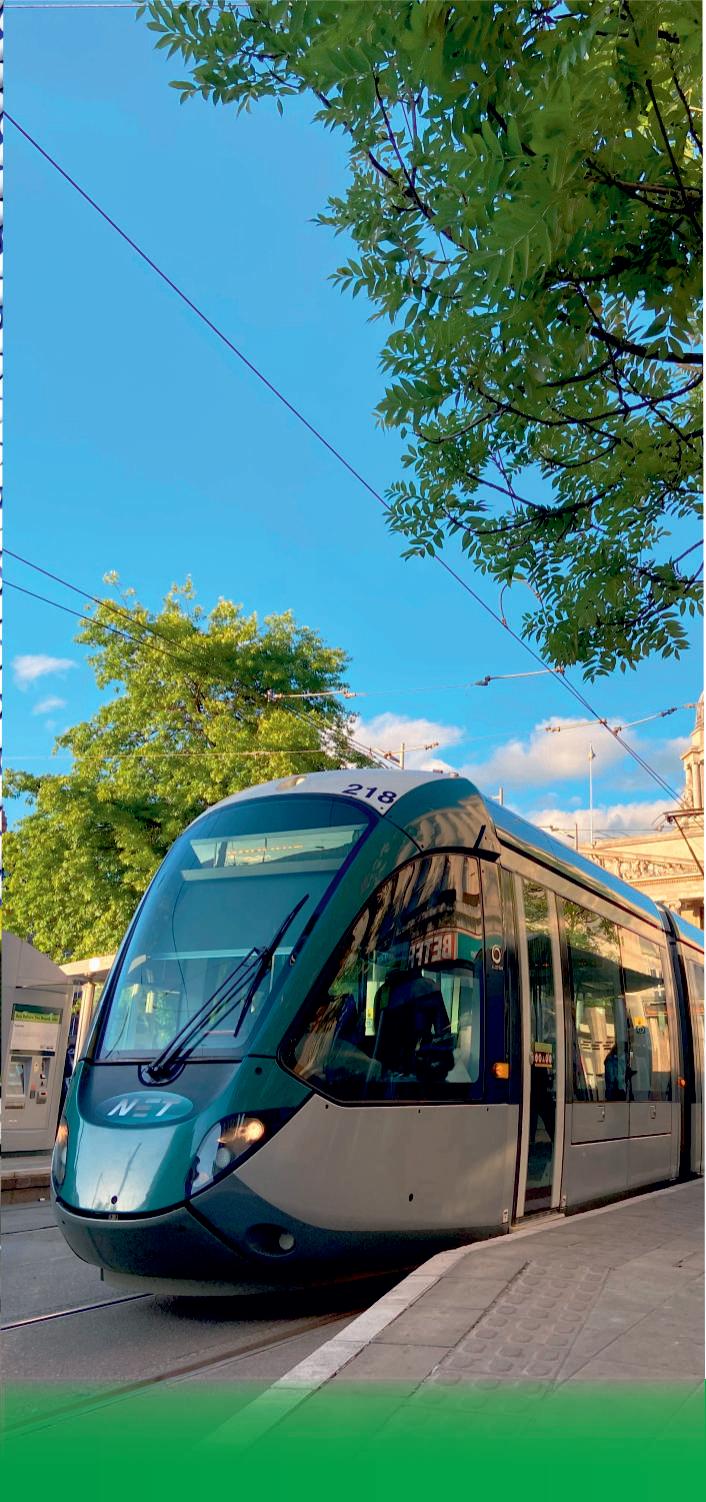


SAVE TIME AND MONEY WITH TIMESPACE CCTV
Helping operators to maximise the benefits of installing vehicle CCTV




Timespace Technology’s digital video recorders (DVRs) and supporting sofware allow operators to maximise the benefts of installing vehicle CCTV.
DIGITAL VIDEO RECORDERS FOR ALL SIZES AND TYPES OF FLEETS


Timespace ofers DVRs supporting 4-24 channels of video, with recorders available for standard analogue, AHD, TVI(1) or IP cameras. All products have hard-disk storage up to 4TB. Te V400 is installed in thousands of UK buses and coaches, including many of the UK’s largest feet operators. Te forthcoming
V700 Network Video Recorder ofers Timespace’s frst full-HD solution, supporting up to 20 HD IP cameras. Te V700’s Onvif interface allows integration with other on-board systems, providing a fexible and future-proof system.
REMOTE FOOTAGE DOWNLOAD AND LIVE CAMERA STREAMS
Fleet operators can preview recorded footage, download video and view live camera streams over mobile networks, all via Timespace’s LANLink Live platform - meaning footage can be viewed, obtained and shared without waiting for the vehicle to return to the depot. Operators can remotely view and select recorded


footage based on the date/time, geographical area or alarm triggers. Footage can be converted to MP4 fles and played back in any web browser, simplifying the process of sharing evidence.
“We know how valuable time is for feet operators. LANLink Live allows operators to review events, and pass footage to managers and the emergency services, faster than ever before,” says Henry Heylen, Timespace’s commercial director.


LANLink also provides real-







time CCTV health information, including camera snapshots, email alerts and SMART data (for harddisk faults). GPS vehicle tracking and vehicle CAN engineering data are also included, both essential for making feet management efciencies.
LOW LIFETIME COST FOR VEHICLE CCTV
Timespace DVRs have a reputation for quality, reliability and longevity. With simple installation, long warranties and full UK-based support and service facilities, Timespace is the best choice for vehicle CCTV.
www.tspace.co.uk
01480 414147
27
The ALBUM Report 2023 Timespace
LANLink Live VIDEO MANAGEMENT SYSTEM • Live camera streams over 4G • Remote footage viewing and downloading • View recordings in any web browser • Cost and time savings for operators • Compatible with all current Timespace DVRs Timespace V500 Digital video recorder Proud to supply vehicle CCTV to tspace.co.uk
“Timespace DVRs have a reputation for quality, reliability and longevity”























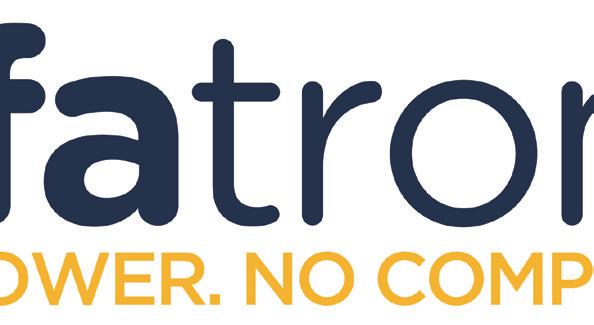

No matter how your business purchases fuel, you can fix your diesel price for up to 12 months. Know what every litre will cost. Budget with confidence. www.alfatronix.com FOR ALL YOUR ONBOARD CHARGING UK MANUFACTURER OF WIRELESS & USB CHARGERS, VOLTAGE CONVERTERS, POWER SUPPLIES, LOW VOLTAGE DISCONNECTS AND BATTERY CHARGERS SINCE 1979.
THE ALBUM CONFERENCE WORKBOOK 2023























































brought to you by BRITAIN'S MUNICIPALLY-OWNED AND INDEPENDENT BUS SECTOR
in association with
Headline Sponsor
Main Sponsors
Sponsors
WELCOME TO EDINBURGH
As Lothian’s Managing Director, it is my great privilege to welcome you all to Edinburgh and the ALBUM 2023 Conference at the Sheraton Grand Hotel and Spa. We are delighted to be hosting this year’s event and are looking forward to the next few days.
Ever since it was announced that Lothian would be host this year’s conference, our team have worked hard to create an engaging and informative schedule of content centred around the theme ‘the changing face of our industry,’ focusing on four pillars –our people,
customer, policy and product. We have contributions from experts from both within our industry and outside, as we look to overcome the challenges of the last few years and embrace future thinking.
Supporting the programme will be exhibitor stalls from our generous suppliers showcasing the latest in bus and coach technology.
Alongside keynote speakers, we have engaging panel sessions to stimulate wider discussion around each of our four core themes and I hope you will fnd these sessions
insightful.
Our event will close as always with the Gala Dinner and entertainment – we have a great night planned to celebrate our industry and those working and leading within it.

I hope you enjoy ALBUM 2023 and your time in Edinburgh. It is always worthwhile when everyone comes together to showcase the best of bus and highlight what we can do for public transport going forward.
Sarah Boyd, Managing Director, Lothian
30
The ALBUM Report 2023
GOLF DAY
MONDAY 24TH APRIL
11.00AM
Golfers depart for Prestonfeld Golf Course
6.00PM
Departure for boat tour on Forth Belle
Sponsored by Allison Transmission
10.00PM
Return to Sheraton Grand Hotel
DAY 1
TUESDAY 25TH APRIL
12.00PM
Exhibition opens
Lunch and networking
Sponsored by Ticketer
1.30PM
Conference opens
Dave Guest welcomes and opens day one
1.40PM
WELCOME FROM YOUR CONFERENCE HOST
Sarah Boyd, Managing Director, Lothian
1.55PM
WELCOME FROM ALBUM
Bill Hiron, ALBUM Chair
2.10PM
POLICY
Kevin Stewart, Transport Minister, Scottish Government
2.30PM
POLICY PANEL DISCUSSION
chaired by Susan Deacon CBE
Paul White, CPT Scotland
Daisy Narayanan, City of Edinburgh Council
Liz McAreavey, Edinburgh Chamber of Commerce
3.00PM
Cofee break and exhibition time
Sponsored by PSV Glass
3.30PM
UK-WIDE ACCESSIBLE INFORMATION REGULATION
Claire Walters, CEO, Bus Users UK
3.45PM
CUSTOMER PANEL DISCUSSION
chaired by Claire Walters
Olivia Sklenar, Lothian
Victoria Garcia, Brighton & Hove
4.15PM
CUSTOMER
Gordon Dewar, CEO, Edinburgh Airport
5.00PM
Close of day one
6.30PM
Johnnie Walker Whisky Tour
Sponsored by Zenobe
8.30PM
Bufet dinner at Ghillie Dhu
Sponsored by Alfatronix
DAY 2
WEDNESDAY 26TH APRIL
9.00AM Exhibition opens
9.30AM
OUR PEOPLE
Sonya Byers, CEO, Women in Transport
9.50AM OUR PEOPLE
Sandy Begbie CBE, CEO, Scottish Financial Enterprise
10.15AM OUR PEOPLE
PANEL DISCUSSION
chaired by Sandy Begbie CBE
Rona Hunter, Capital City Partnership
Alex Warner, Lost Group
Sonya Byers, Women in Transport
10.45AM
Cofee break and exhibition time
Sponsored by PSV Glass
11.30AM
PRODUCT – TICKETING
Paul Rogers, Flowbird
12.15PM
Lunch and networking
Sponsored by Alfatronix
1.15PM
PRODUCT – VEHICLE TECHNOLOGY
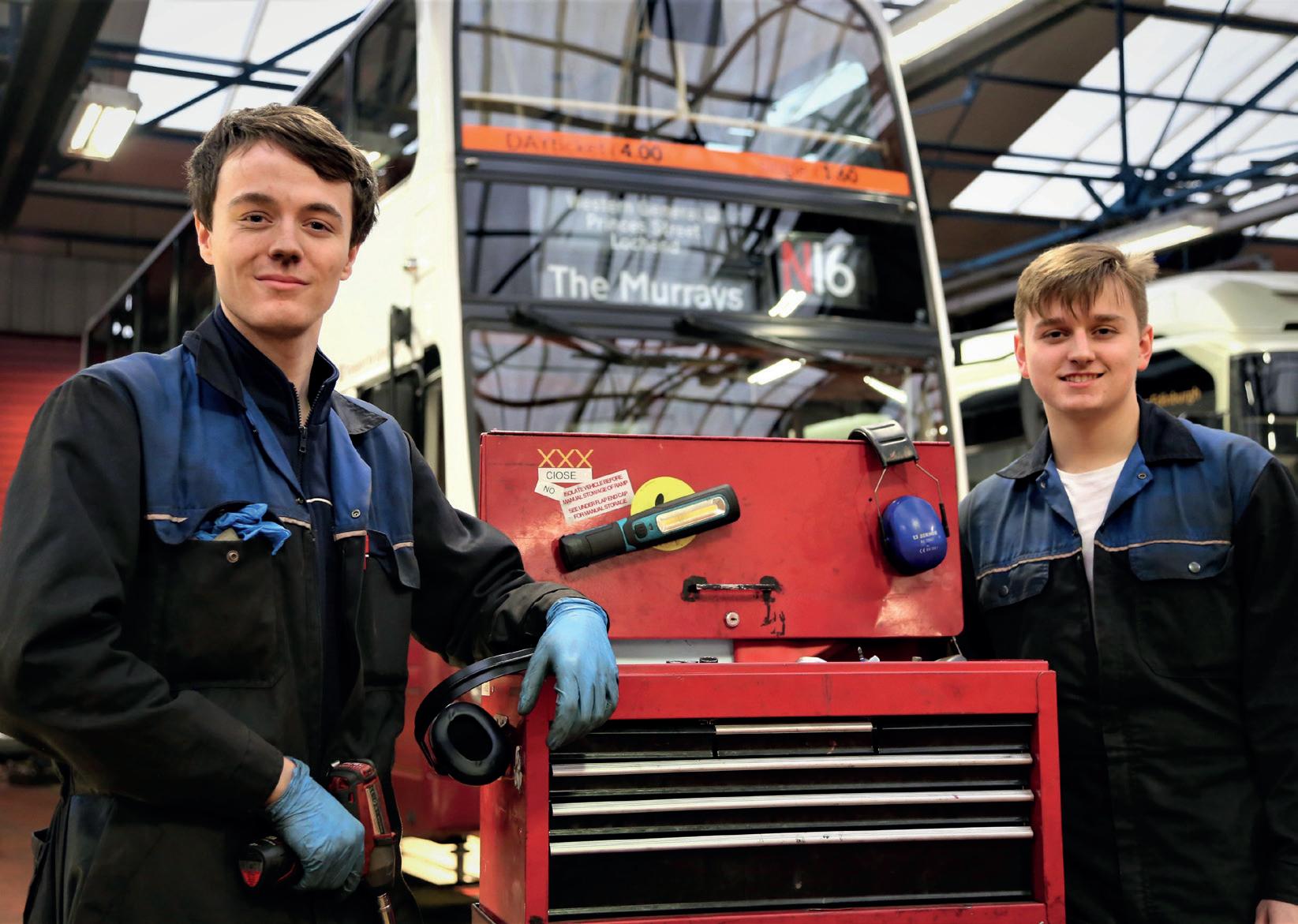
Marie Carlsson, Vice President - Electromobility Business Development, Volvo
1.40PM
PRODUCT –INFRASTRUCTURE
Charlie Jardine, CEO, EO Charging
2.00PM
PRODUCT –INFRASTRUCTURE, AN OPERATOR’S PERSPECTIVE PANEL DISCUSSION
chaired by Dave Guest Ben Wakerley, Warrington
Transport
Colin Barnes, Lothian Ian Foster, Metroline
2.45PM
Cofee break and exhibition time
Sponsored by PSV Glass
3.15PM
CUSTOMER, PRODUCT, OUR PEOPLE, POLICY
Ian Longworth, Former Director of Transport Services, Isle of Man
3.45PM
FINAL THOUGHTS
Bill Hiron, ALBUM Chair Sarah Boyd, Managing Director, Lothian
4.00PM
Networking and exhibition time
4.30PM
ALBUM AGM
7.00PM
Drinks Reception
Sponsored by Ferrymill Motors
7.30PM
Gala Dinner
Sponsored by Switch Mobility
Table plan sponsored by Timespace
Afer Dinner speaker –Colin Robertson CBE
31 The Conference Programme
'Our People' will be one of the themes explored at this year's ALBUM Conference in Edinburgh
YOUR LINE-UP OF SPEAKERS
Read the biographies below to familiarise yourself with your expert line-up of speakers
Dave Guest is a well-known face to regular ALBUM attendees and has moderated the ALBUM Conference since 2007. He was formerly chief reporter and presenter on the BBC’s Northwest Tonight programme and enjoyed a 36-year career with the company.
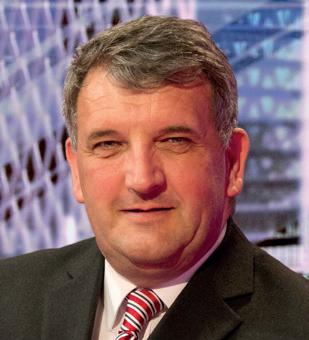
has more than 30 years’ experience in organisational change, policy development and corporate governance. Susan is currently Chair of the Edinburgh Festivals Forum and a Professorial Fellow and Senior Adviser with the University of Edinburgh, and was previously Chair of the Scottish Police Authority and of the Institute of Directors in Scotland.
Chief Executive O fcer, Edinburgh Chamber of Commerce

Liz McAreavy was appointed CEO of Edinburgh Chamber of Commerce in 2016. Liz sits on a range of civic boards in the city including Te Edinburgh City Vision Steering Group, Te Festivals Forum, Te Edinburgh Development Forum, Te Strategic Implementation Group and the Economic Advisory Panel. She also chairs the City’s Just Economic Transition Group.



business’ frst ever Accessibility and Inclusion Ofcer. Olivia’s passion for accessibility has been a driving force during her career and she was previously Sport and Disability Development Manager at Serco Leisure.

Kevin Stewart was recently named as Transport Minister for the Scottish Government having been frst elected as SNP MSP for Aberdeen Central in 2011. Kevin has a long history in politics and was a councillor in Aberdeen City Council for 13 years. A government minister since 2016, He was frst promoted to Minister for Local Government, Housing and Planning before becoming Minister for Mental Wellbeing and Social Care in 2021.
Paul White is the Director of CPT Scotland, the trade association for the bus and coach sectors. Paul is a non-councillor Board Member of SESTRAN and a previous Chair of the Scottish Transport Studies Group. Paul has worked in transport policy for almost 20 years across Scotland, Westminster and Brussels.
CLAIRE WALTERS
Chief Executive O fcer, Bus Users UK
Claire Walters has been Chief Executive Ofcer of Bus Users UK since 2012. A champion of social inclusion, she has worked extensively with marginalised groups to improve access to life’s opportunities.

of Placemaking and Mobility, City of Edinburgh Council
Daisy Narayanan has been Head of Placemaking and Mobility at the City of Edinburgh Council since January 2022, having previously worked at the council as a senior manager. Daisy was Director of Urbanism at SUSTRANS for two years and has enjoyed a long career in Urbanism, with experience of working in India, Singapore, England and Scotland.

OLIVIA SKLENAR Accessibility and Inclusion
O fcer, Lothian
Olivia Sklenar joined Lothian in January 2020, becoming the
VICTORIA GARCIA Accessibility and
Communities
O fcer, Brighton and Hove
Victoria Garcia has been Accessibility and Communities Ofcer at Brighton and Hove and Metrobus since 2018, and has been working at the company for over 13 years. A daughter of a bus driver, Victoria grew up in the industry and has enjoyed a successful career in accessible travel.
Chief Executive O fcer, Edinburgh Airport

Gordon Dewar took up the post of Chief Executive in July 2012. Gordon previously spent four years with BAA running Glasgow and Edinburgh airports through periods of extensive investments in terminal capacity and passenger growth from 2007 to 2010. He then spent two years as Chief Executive at Bahrain International Airport. He has held a number of senior positions with leading transport operators, including commercial, general management and business development roles in bus and rail operations. Prior to this he spent 10 years in Transport Consultancy.
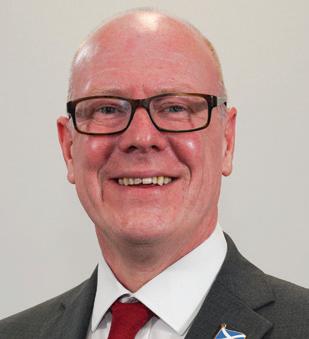
32
DAVE GUEST
KEVIN STEWART Transport Minister, Scottish Government
SUSAN DEACON Non-Executive Director, Lothian
A former Edinburgh MSP and Scottish Minister, Susan Deacon
PAUL WHITE Director, Confederation of Passenger Transport Scotland
DAISY NARAYANAN Head
LIZ MCAREAVEY
The ALBUM Report 2023
GORDON DEWAR
of Edinburgh Council. Tasked with co-ordinating the Local Employability Partnership, CCP works with employers to tackle poverty and inequality and respond to opportunities in Edinburgh and surrounding regions.
SONYA BYERS Chief Executive, Women in Transport
Sonya Byers is Chief Executive of Women in Transport, a nonproft membership network advancing women working in transport and raising awareness of the opportunities in the sector. Women in Transport provides events, networking, mentoring and leadership development for its members and acts as secretariat for the All Party Parliamentary Group (APPG) for women in transport.
Alex’s diverse and multi-modal career began 30 years ago at London Underground. He worked for British Airways, the Strategic Rail Authority, four train operating companies and First UK Bus before joining Royal Mail. He lef in 2019 to solely focus on Flash Forward Consulting, which he had set up in 2012, before selling the company to Tracsis Plc in 2021.

developing EO’s frst charger on his family’s farm in Sufolk. Having previously worked in the EV charging industry, Charlie had identifed huge opportunities for improvement and founded EO in 2014 with the pledge to “make charging simple and reliable”.
Ian Foster is Group Engineering Director for Comfort DelGro, overseeing Engineering functions in depots in London, Wales and Ireland. Ian is responsible for over 1800 vehicles, with nearly half of them being hybrid-electric or hydrogen vehicles. He was instrumental in bringing the frst hybrid buses to London in 2008 and the world’s frst double deck electric vehicle in 2015.
Ian has over 46 years of experience in the industry, having worked in the bus, truck and aviation sectors. He sits on the CPT Engineering group and is Chair of the UK Electric Bus Operator Engineering Group.


Ben Wakerley is Managing Director of Warrington’s Own Buses, which has just moved into a brand new electric-ready bus depot. It is set to replace its whole feet with electric buses in the next year, as one of the biggest transformations of a bus feet in the country.

SANDY BEGBIE CBE Chief Executive, Scottish Financial Enterprise
Sandy Begbie has been CEO of the Scottish Financial Enterprise since October 2020, having previously been the HR Director and Group Director of Talent Management at Scottish Power. Sandy’s career has taken him all over the world including positions in China and Hong Kong while at Standard Life. HR Magazine recently dubbed him as “the most infuential HR practitioner in the UK.”
Marie Carlsson has been driving electromobility business solutions at Volvo Buses since 2015. During her time at Volvo, Marie has had a number of commercial positions in automotive logistics and people transport development.


Colin has spent his entire career in the transport industry starting out as an Apprentice Mechanic Engineer with Go North East. In January 2023, Colin joined Lothian as Engineering Director and is excited to lead Lothian’s engineering teams with a focus on embracing new technology and maintaining one of the most modern feets in the UK.
IAN LONGWORTH
Ian Longworth had already had a long and diverse career before moving to the Isle of Man in 2009 as Director of Transport Services for the Isle of Man Government. Here he was not only responsible for the four heritage railways, buses, and minibus feets but also the other 2,500 government transport assets. His retirement in 2022 was delayed by Covid.
RONA HUNTER Chief Executive Ofcer, Capital City Partnership
Rona Hunter is the Chief Executive Ofcer for Capital City Partnership (CCP), an ALEO of Te City

Charlie Jardine is the Founder and CEO of EO Charging (EO). Aged 23, Charlie spent 12 months

ROGERS UK Sales and Marketing Director, Flowbird
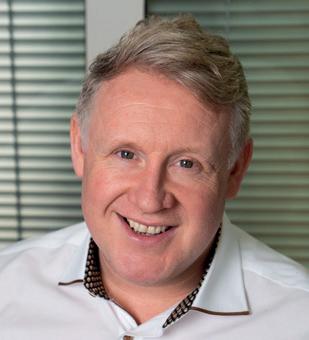
Paul Rogers joined Flowbird as the company’s UK Sales and Marketing Director in 2016 and is responsible for business development and account management. Paul has enjoyed a successful career building B2B sales with major transport clients in the UK and international markets.



33
ALEX WARNER
MARIE CARLSSON Vice President, Electromobility Business Development, Volvo
CHARLIE JARDINE Founder, Chief Executive Ofcer, EO Charging
BEN WAKERLEY Managing Director, Warrington’s Own Buses
COLIN BARNES
Engineering Director, Lothian
IAN FOSTER Group Engineering Director, Comfort DelGro
les
The Conference Speaker Profi
PAUL
34 The ALBUM Report 2023 1 12 13 2 3 48 4 47 45 5 46 8 9 7 10 6 11 34 33 14 32 15 31 28 30 26 27 29 18 16 17 23 21 22 24 20 25 19 36 35 41 40 37 42 38 39 43 44 Catering Catering Catering EDINBURGH SUITE FOYER Toilets Toilets
BRAEMAR EILEAN DONAN THE ATRIUM Entrance /Exit BUS DISPLAY FRONT BUS DISPLAY REAR
GLAMIS CULZEAN
EDINBURGH SUITE
26
27
28
Conference room
30 Lazzerini lazzerini.it
31 Tranzaura tranzaura.com
32
33
34
EDINBURGH
24 Ticketer ticketer.com
25 Allison Transmission allisontransmission.com
29 EO Charging eocharging.com
GLAMIS
35 Bridge Systems bridgesystemsltd.com
36 GridBeyond gridbeyond.com
37 EPM and Omnibus Solutions epm-bus.com
38 Ardent Limited formanvehicleservices.com
39 GIRO Ltd giro.ca
CULZEAN
40 Synetics Security synecticsglobal.com
41 PB Bus Marketing pbbm.co.uk
42 Chargepoint chargepoint.com
43 Freeway Fleet Systems freewayfeet.com
44 Rise Digital Media risedm.com
BRAEMAR
45 TBF tbf.org.uk
21
46 Sure Solutions suretransport.co.uk
47 UK Bus Awards ukbusawards.org.uk
journeo.com
48 Altro altro.com/uk
35 The Exhibition Floorplan EXHIBITORS THE ATRIUM 1 Alfatronix alfatronix.com 2 Timespace Technology tspace.co.uk 3 INIT Ltd initse.com 4 Optibus optibus.com 5 MiX Telematics mixtelematics.com 6 Muirhead muirhead.co.uk 7 Parksafe Group parksafegroup.com 8 Transmach Systems Ltd transmach.co.uk 9 Backhouse Jones backhousejones.co.uk 10 Flowbird fowbird.group 11 PSV Glass psvglassandglazing.co.uk 12 Passenger passenger.tech 13 MyTrip mytrip.today
14 Mellor mellorbus.com
15 Equans navineo.co
Hanover Displays hanoverdisplays.com
Camira Fabrics camirafabrics.com
Pelican pelicanyutong.co.uk
Tracsis Transport Consultancy tracsisconsultancy.com
Teknoware
teknoware.com
Zenobe
zenobe.com
SUITE FOYER
ADL alexander-dennis.com
Wrightbus wrightbus.com 18 Volvo volvobuses.com/gb
Switch Mobility switchmobilityev.com
Voith Turbo Ltd voith.com
16
17
19
20
Robustel Technologies robustel.com
Mobileye mobileye.com
Journeo
22
23































































































































































































































































































































